
Meet the writer:
Cassandra Wolfe is a writer who loves the fantastic, whimsical craziness that comes from fiction. She lives in the Fantasy and Science Fiction space, but loves notes of the horrific, especially the tingling dread conjured by the surprising or terrible. That said, the sweet side of things: themes of family and close friendships always creep into her work. If these things interest you, read on.
I don't know if I ever really explained the challenge I set for myself in writing these. For a few years, I enjoyed sketching for inktober with my friends. When I did, I recall that I always wanted a similar challenge for writing. Because I always struggled (and still struggle) with short fiction at times, I wanted to write as short as I could. I chose micro fiction and set out to write one a day to the prompts of Inktober. Below are all the fictions I wrote for 2024 cleaned up a little in regards to typos and punctuation.
Inktober micro fiction no. 1 (Backpack)
- World Leak -
The backpack is tattered and the zippers don't work, but the stranger walks. Keeps walking. Pieces of another world falling soundlessly behind them. - 2024
Inktober micro fiction no. 2 (Discover)
- Old Bones, New Bones -
Volunteers in hazmat crawl over the wreckage. They brush ash off civilization, off bones, off verdant flora. They slip through a metal hull. Tip toe over drills, welders, and sledge hammers. Pass a wall of spent power cells. - 2024
Inktober micro fiction no. 3 (Boots)
- Boots -
One boot washed ashore. Then two. In one hour there were three dozen.
Only the right foot. - 2024
Inktober micro fiction no. 4 (Exotic)
- Plumed Strider -
The crown is red or purple. Beneath, a tangle of twisted, scraggly fur. Beware of look-alikes; hooks protrude from the strider's legs.
Men hang from its belly, hands tangled, ankles cutting through the tide.
- 2024
Inktober micro fiction no. 5 (Binoculars)
- If You See It, It Comes Closer -
My baby sister's playing in the field when the warning goes out. The binoculars aren't mine, hanging around the neck of the neighbor boy, but he lets me use them while he hides behind his hands. - 2024
Inktober micro fiction no. 6 (Trek)
- Every Night -
I fill my night stand with these.
Water: three bottles; this is going to be an eight hour trek.
Electrolytes: in case I'm climbing mountains or running from monsters.
Shoes, a change of clothes, a flashlight, and a backpack. - 2024
Inktober micro fiction no. 7 (Passport)
- Bungee -
There are two women at the edge. The first paints you a new face to use during the jump; you won't lose yourself. The second records your name on her arm; you won't lose your identity.
A sign reads: Best jump on a cloudless day
- 2024
Inktober micro fiction no. 8 (Hike)
- Taller than Everest -
I'm shivering, but I've already switched my jacket for a thermal suit, my scarf for a helmet wth oxygen supply.
I chip the ice from a sign at the top. "Take one. They're hot." - 2024
Inktober micro fiction no. 9 (Sun)
- Before the End -
Solar activity has hit an all time high. Expect disturbances as the Earth is struck by multiple X class CMEs. Telescopes across the globe point at the sun. Everyone's watching the moment something crawls out of the fire. - 2024
Inktober micro fiction no. 10 (Nomadic)
- A Place to Stay -
They stop to take the air. Take a reading. The temperature. The weather:
Sunny. 70 degrees. Hostile.The next:
Crisp. 40. A clear, cloudless night.The next:
Rain. A woman shares her umbrella. Smile decidedly unfriendly. - 2024
Inktober micro fiction no. 11 (Snacks)
- Snacks -
The ma'kun lizard doesn't need to eat meat, but hates birds, and can smell fruit at five miles. They swallow the fruit whole, even if they can't digest it.
Bellies round, they hang from branches, turning bright and emitting the same sweet scent. - 2024
Inktober micro fiction no. 12 (Remote)
- Inside Out. Upside Down. -
A crate slides off a ship and crunches, leaving a splinter sized gap to squeeze through. The world is alien: the grass red and sky turned a hazy green from billions of copper particles. Three of a dozen escape, but to a place upside down. Inside out. - 2024
Inktober micro fiction no. 13 (Horizon)
- Villan's Notes -
Event Horizon: Light goes in and doesn't come out. - 2024
Inktober micro fiction no. 14 (Roam)
- Earth Bound -
Her roots tear free with every step. To fields. To ruins. She trails her fingers over ancient glyphs and bent signs at the edge of roadways. Vegetation follows her through town, where gutters and flowerbeds bloom out of season. - 2024
Inktober micro fiction no. 15 (Guidebook)
- Rules of the House -
1. The salt is in the cupboard
2. Eat what you want from the fridge
3. Curtains drawn after 9pm to block the neighbor's flodlight
4. A dog will paw at the door at midnight
5. Don't feed it - 2024
Inktober micro fiction no. 16 (Grungy)
- Dragon -
He lurks in water where silver sparkles. His clothes are ill fit and pants soaked to the calves. The cold draws a gasp from him as he slips in to his ribs, and he almost forgets to hold his breath before dragging the pan through the mud, sifting for his scales. - 2024
Inktober micro fiction no. 17 (Journal)
- Change of Heart -
The hero had a thought. A novel one. An outlandish one.
Inside their journal was a single prompt:
Take over the world. - 2024
Inktober micro fiction no. 18 (Drive)
- Muse -
My muse is a flicker of dark cloth in the corner of my eye; she's the sensation that puts my hair on end. She hides behind my reflection when I peer through a dark window. - 2024
Inktober micro fiction no. 19 (Ridge)
- On the Ridge -
It's framed in the window every morning that I choose to wear my yellow dress. Its skin is blotchy gray and its knees scraped and red. I know because I see it every evening, watching from the ridge in its tattered yellow strands. - 2024
Inktober micro fiction no. 20 (Uncharted)
- Styx -
The water's shallow beyond the fog bank. The rowboat bounces between the rocks as the stranger guides them down a narrowing river.
The air, once humid and thick, now grows too thin to breathe. Bent figures fill the bank, herding them on until they run ashore.
- 2024
Inktober micro fiction no. 21 (Rhinoceros)
- Rhino -
A girl follows them in skin almost as gray and rough as theirs. While they eat, she tears her hair out in handfuls and pinches her nose into a point. - 2024
Inktober micro fiction no. 22 (Camp)
- Backwoods Nightmare -
There's a whistle in the trees. Beside the tent. In the trees. Beside the tent.
A bird.
But it calls other things. Tall things. Long limbed things. Creaking among the trees.
- 2024
Inktober micro fiction no. 23 (Rust)
- Rust -
Jerry sweeps the floors and remembers numbers. They oil their own joints and update their memory to old CDs. When the master leaves, they hold the light. - 2024
Inktober micro fiction no. 24 (Expedition)
- Case 193 -
The psychoanalyst sits down with two officers, the max number permitted to enter a human mind at a time, even a criminal one. "Rooms will be computer lit. You'll find shattered glass but no windows. Expect an excess of nondiagetic ticking.
The judge granted you three days." - 2024
Inktober micro fiction no. 25 (Scarecrow)
- Scarecrow -
There's always a need for scarecrows in Kansas. Standing in the field, a woman drags a piece of straw from her teeth and threads it through the hair of her latest.
Her scarecrow is special: twisting against the twine that holds it's wrists and shouting around the gag. - 2024
Inktober micro fiction no. 26 (Camera)
- Camera -
Clacking on the rails. Train. A view through the window reveals buildings and alleys.
Blink.
Hanging gray legs from ankle to calf.
Click.
Buildings and alleys. - 2024
Inktober micro fiction no. 27 (Road)
- The Road -
Will be red if you never pursue your dream.
Orange if you never appreciate the things around you.
Yellow if you never reinvent yourself.
Green if you never find peace.
Blue if you never question what's inside.
Indigo if you never try to understand those around you. - 2024
Inktober micro fiction no. 28 (Jumbo)
- A Name -
I'm at the mercy of mine. Alice they say, and I grow small. Alice they say, and I grow large. I pass a tiny building on the sidewalk, and I can't enter. But Alice, they say, and I'm too small to open the door. - 2024
Inktober micro fiction no. 29 (Navigator)
- Navigator -
Color is the language of dreams, and I'm the interpreter. I'll prevent things from going bad; I'll guide you away from the grays and into the greens. That is, as long as there's something to lead you away to. - 2024
Inktober micro fiction no. 30 (Violin)
- The Violin -
leans against the cellar wall. The door locked and key melted to slag. The man had the strings removed, but there are fingerprints charred into the fretboard and five more singed into the bow. - 2024
Inktober micro fiction no 31 (Landmark)
- Landmark -
An old god turned the river green. The town gushes from it, children play in it, travelers use it to mark the miles.
A new god turns it red: no one fishes anymore, no children splash in the shallows, travelers use it to mark the miles. - 2024
A few of these are a bit darker in terms of content. I've marked them with an asterisk for those who want to avoid them.
1. A dragon and drought
2. A weaver of fates who can't read people
3. Sci fi action/comedy
4. About a dead man*
5. A tourist searches for magic
6. A monster story
7. The scientist and plasma fish
8. A woman searches for a lost world
9. A colossus and her handler
10. Monsters with a sweet tooth
11. A pyromancer loses her spark
12. Mini mystery*
13. Death goes out for dinner*
14. Outwitted by the apprentice
15. A jacket with a history
16. A troublesome commute
17. A kidnaping for the crystal gallery
18. A demon makes a deal
19. In pursuit of a monse
20. A tailor tries to save his business
21. Building homes for the dead
22. Infiltrating the manor house
23. An ex soldier tries to escape a nightmare*
24. The eldritch needs a horse
25. Action, fire, tragedy
26. The invention works too well
27. The queen's gardener vs. vampires
28. Summoning the dark lord's army
29. A servant learns to write
30. An old man seeks closure*
31. Blobby
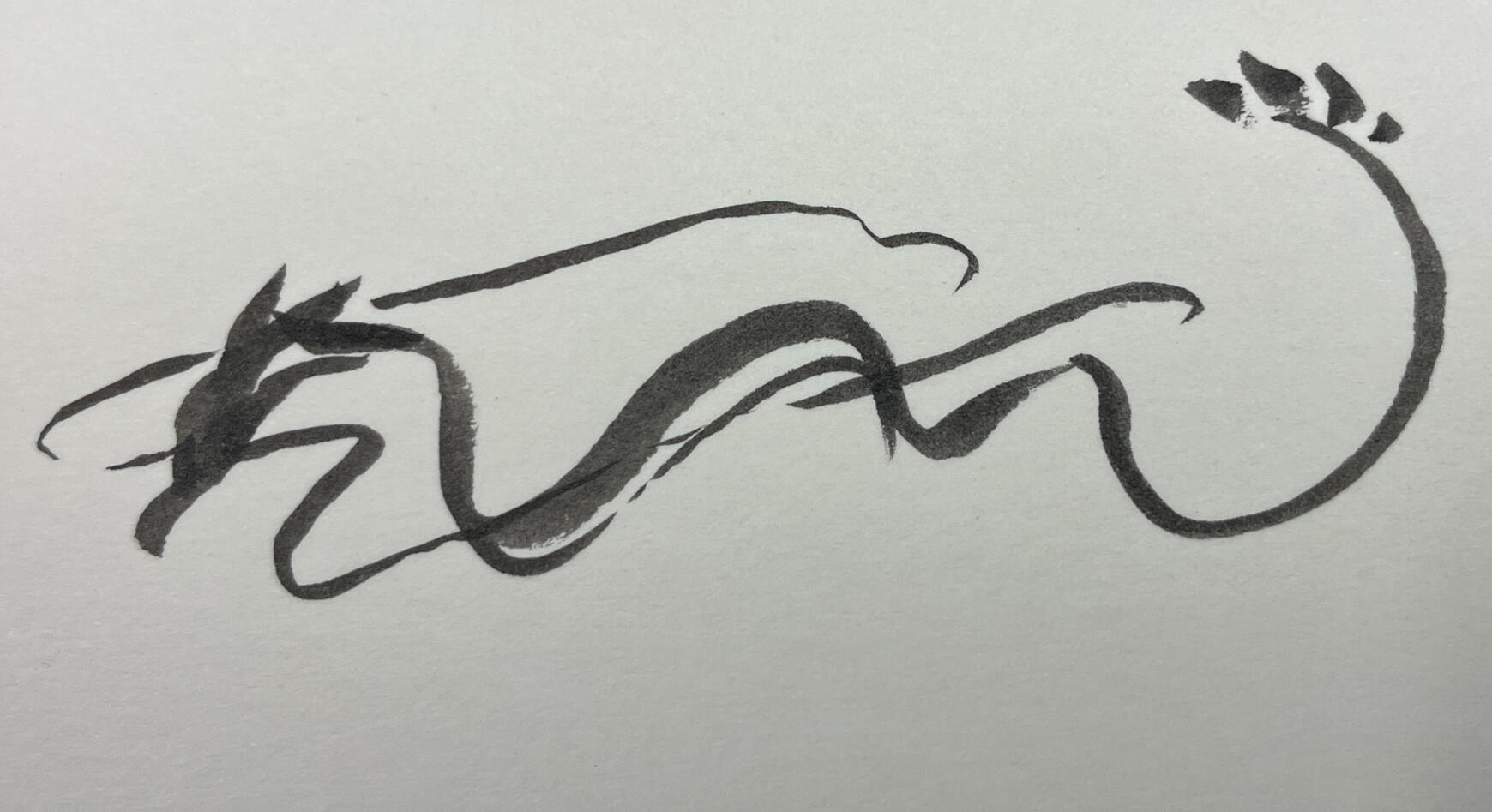
1. The River Vrye
Vrye was born beside her village. She flowed down from the mountain, running alongside farmland, homes, and market stalls. Everyone who lived and worked there was her child or grandchild, even though she was a dragon and they were human. Back then, she loved for the children to play with the whiskers that sprouted from her snout like the fingers of a great river.One sweltering summer, the rivers baked. The water evaporated. And when their buckets scraped the bottom of the well, the children no longer came to play. Vrye shriveled, her muscles reduced to sinew, her scales lost their luster, and she didn’t have the energy to play with the children anyway, even though she ached to.She turned to the damn. She could feel the water trapped behind the large rock wall to the north of the village. Collapsing across the valley, rain had collected and built behind that wall for centuries and had grown into a lake. She scrambled up the rock wall, twisting herself around the stones at the top in the hope of dislodging them. She couldn’t move a single one, not even the smallest. They were all damp and slick, and her scales scraped against the stone. With her last attempt, she slipped free and tumbled down to the bottom. She laid in a heap, panting hot, dry breaths. She scraped at the ground where she lay. Ineffectually, hoping to dig a path for the water beneath the wall.The attempt exhausted her. She laid at the foot of the wall, listening to the soft lapping of water behind the rocks. Soothing, ringing in her ears like the song trapped inside a seashell. She had been water once, a stream at first, trickling down the side of the mountain. She had grown into a river when water was plentiful, then a dragon when protection was more important than drink. She lifted her head to gaze down at her village.She could be water again.
Picking herself up, her feet and tail dragging over the rocks, Vrye took herself to the edge of the mountain and tumbled over the side. She rolled like water, washing down the old crevasses and flooding the pathways at the bottom. She washed over warm, sunbaked stone and chilled the earth. She became a river, knowing when the village was healthy, she could play with the children again.
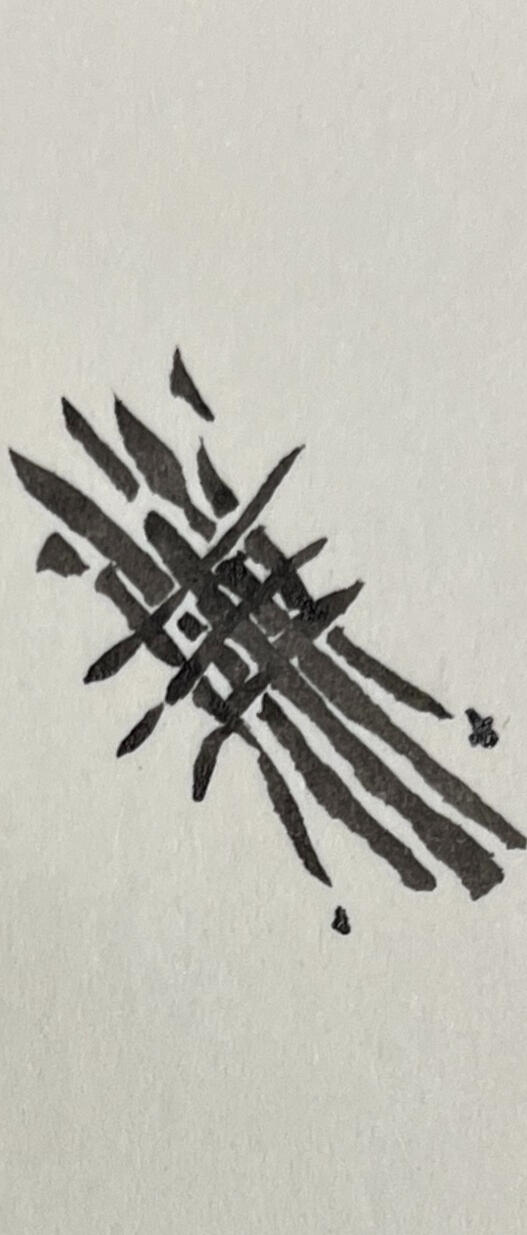
2. The Silver Fates
Everything came through the threads. Silvery lines trembled around the weaver’s bony fingers, responsible for every sensation. Swaddled in the dark, even the air was neither hot nor cold. But through the threads, she could feel anything: a rustling breeze three days in the future, the ripple on the surface of a pond as it congealed with thick green algae. For two decades she pushed the threads to find her target, twisting possibility into a prophecy that would latch onto her target and come true. Though the weaver had always been adept at twisting the lines, she had never, unfortunately, been a good read of humanity.She tossed her lines: these holding the story of a young boy who reached for something beyond him, stretching until he lost everything, and hissed when the lines fell away. They slid off her target, and as always that terrible shriek filled her ears, shaking her bones through the lines. Her mind filled with screams that would have been soothing in their familiarity if they didn’t also cut a foot off her lifeline each time.When they began to fade, she clawed them close, retracing the shape of their shrieks and committing them to memory. The threads showed her futures and accompanying sensation, but only the shrieks happened now. They were her only company in what would be a very short life for someone like her.But that was just it. The threads had always told her the story.Curling her fingers, the weaver tugged on the strings. She conjured sensation and whispers, listening to the information they gave her. She listened to the shape they desired and spun them in twirling patterns that captured those futures. The path was more chaotic than she could ever have crafted alone, but when she threw the lines around her target, they caught. The lines tugged her with them: filling her, flush with youth. She raced through a fire of adolescence, fought through the years of early adulthood, and plodded along what followed. She found the end and saw how right it all was. When she died, she tugged on the threads and ripped herself away, spinning, dizzy.Read? She laughed. All she ever had to do was listen. Everything came through the threads.
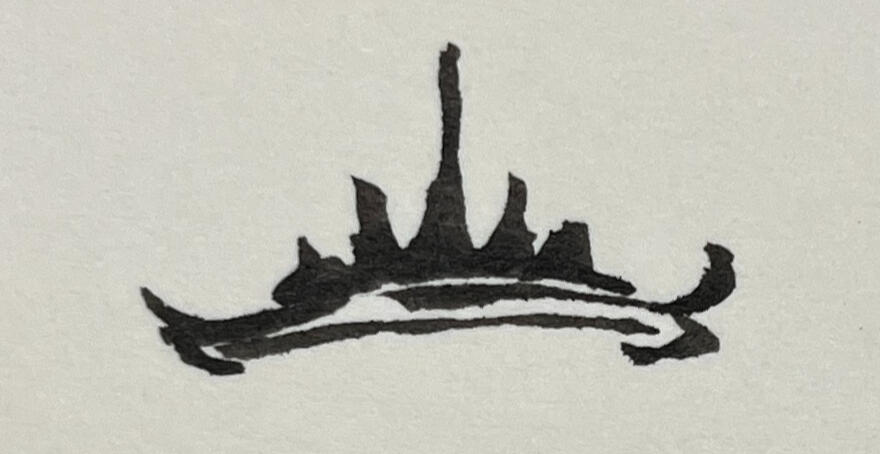
3. Malfunction
Despite having enough know how to get up in a floating disc of metal in the middle of fucking nowhere space, Drey was not a techie. They could wear the suit, run the drills, heck, they could shoot the guns, but they had no idea why their crown wasn’t generating a shield.They took another burn to the shoulder from the oppressor’s charger guns. A smoking singe curled the hair in their nose and left a blast burn on their new uniform. A hand of threads poked like blackened fingers from the seam on their right shoulder.They sank behind the leg of their old issue mech to poke the threads back inside. There was a breach somewhere on the disc: red light flooded the chamber, which only made the crown more necessary. They were probably losing oxygen, and the beeping in their ear didn’t put them in a good mood.Why did the techies pump the malfunction volume so high? And why hadn’t they installed troubleshooting procedures for moments like these? Drey had settled behind their mech, searching through the feeds for a manual to silence the incessant beeping that drilled a hole in their right ear when the red light on the crown winked out.Bad battery.Huh. Somehow, Drey thought they had moved past that.More to the point, they still didn’t have a shield. They stood, careful to keep in the silhouette of their original issue mech. A rap of their knuckles on the metal plate encouraged the machine to inch forward. Drey followed on its heels, taking the intruders as they emerged. A smirk grew on their face as they inched forward, until they were laughing in the wreckage. The charger gun–overheating–burned their trigger finger.They dropped it, steeping over the wreckage in search of the breach. No shield necessary.
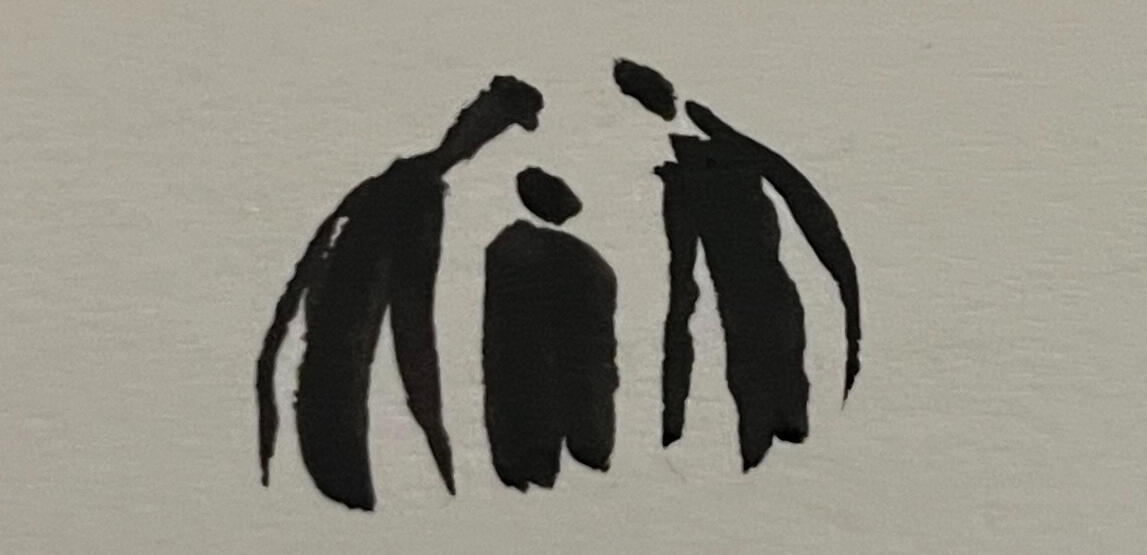
4. Becoming Memory
Sharp stones dug into the soles of the dead man’s feet. Puddles, dozens of them, sank in small divots across a cratered, hazy field that had more in common with the surface of the moon than anything the dead man remembered from earth. There wasn’t anything else: no trees, no brush, no clouds hanging in the gray, expressionless sky except those that sat permanently behind their eyes. On that thought, perhaps the field wasn’t hazy at all. Maybe that was the dead man’s perception of it.Step by wincing step, he shuffled to the edge of the nearest puddle and squinted at the surface. Hell decided to keep him blind, his cataracts hiding even this desolate world from him. He splashed through the puddle–or tried to. Instead, he sank.Falling in was like a migraine headache across the entire body: throbbing, aching, and pressure on all sides that forced him to draw breaths as short as his youngest niece. Never grew an inch, that kid.He gasped, struggling when the pressure turned into shadows. Arms wrapped around him, igniting a fire in his chest. He needed air. The fire rose into his throat as he twisted, prying at the shapes. He clawed at the hands, kicked at their knees and shins, but they were stronger. He fell. His cheek grated on stone and his fingers dug against the rock.He collapsed beneath the pressure. His memories: his regrets, joys, and actions pooled in a single murky pocket of stone. And he was free.
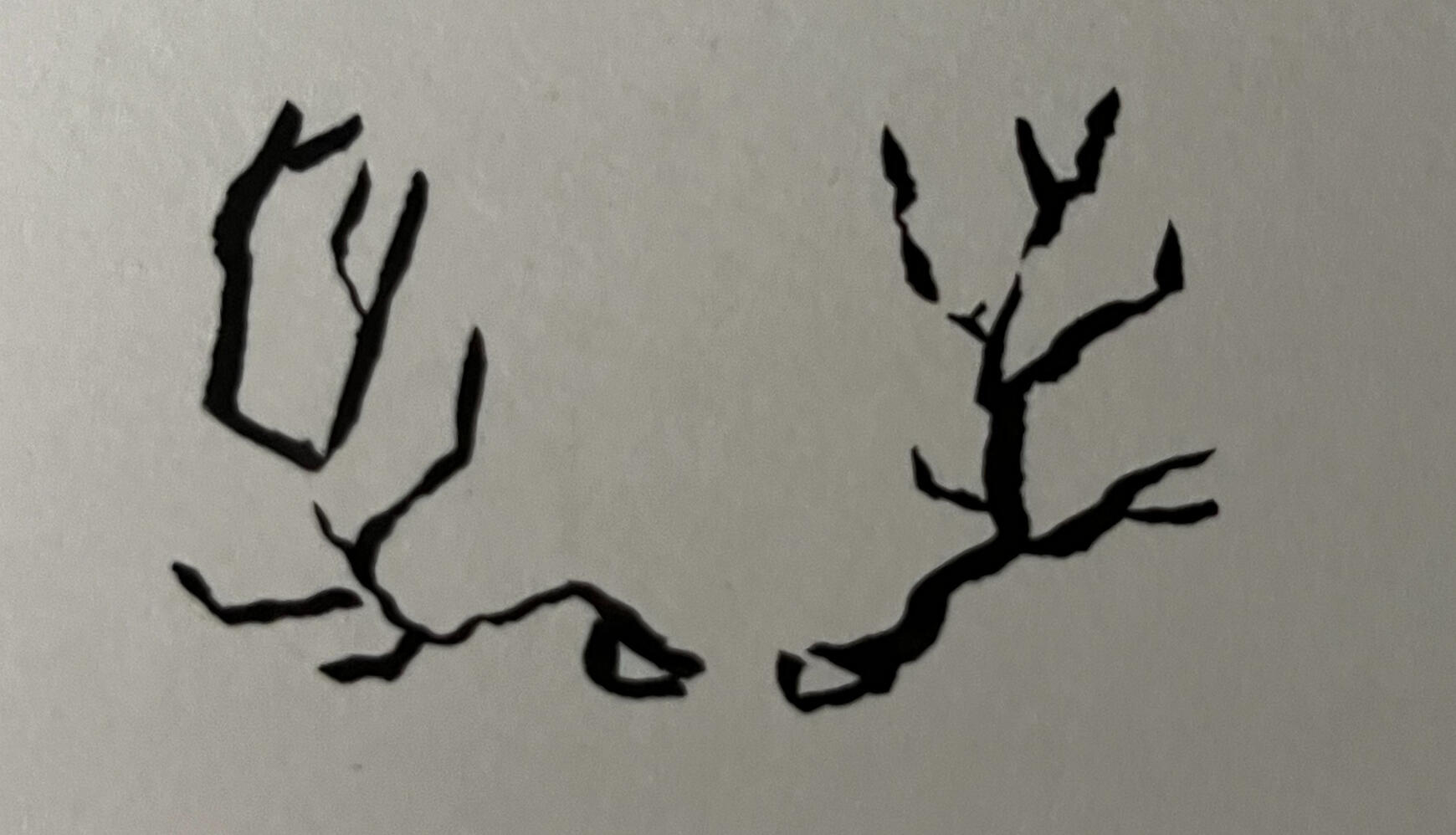
5. Water Grazing
The tourist knew that the oar-man was trying not to stare at her overly wrought button-up. It was beautiful of course, a riot of color depicted mythical landscapes in washes of tangerine and cerulean. The imagery would have perfectly captured this lake, if the sun hadn’t baked all the color out of it.The water burned her eyes as easily as staring directly into the sun, so she directed a spyglass at the rocks while the man rowed, avoiding the blinding combination of sun and water, searching for something fantastical.This was the last day of her vacation, and if she didn’t find something noteworthy, her sister wouldn’t let her hear the end of it.“Tell me about the lake,” she prompted. A few moments passed. When he still didn’t respond, she lowered the glass in her lap and squinted at him. “Tell me about the magic.”He cocked an unimpressed eyebrow, though she almost missed it beneath the mop of his curls. “Hired to row, not teach history.”She fished in her pocket for her last coin and sighed when her bracelet snagged on the pocket. She fought with the charms and the cloth of her shirt until the oar-man shook his head.“I need something special for magic.”“Fine,” she said, freeing her wrist.“Show me.”He tilted his head to the water.“You want to blind me?”“Look.”She lifted her fingers beneath her eyes to cut the glare–she could use her sunglasses if they weren’t holding back her hair. She bit her lip and squinted. Something stirred at the spot he indicated, and as she watched, a shape rose. First were antlers, a shoulder, then another. The legs and hooves were last of course, but within moments, a herd of deer rose from the water and poked around on the surface. Shimmering blue-white in the sunlight, they appeared to graze on the water.When she turned back to the oar-man, her eyes wide and jaw agape. He held out his hand.She plucked the glasses off the top of her head and laid them in his palm with gravity.He belted a laugh. “I suppose those are special on waters like these. I accept.” He allowed his fingers to curl around the lenses, then lifted, and settled them on his nose.That settled, the tourist reached for the camera beside her on the bench. The metal burned when she plucked it up, forcing her to toss it hot potato between her hands until it cooled. It was, however, fried. It would not turn on no matter how many times she mashed the button. She sighed, and the man’s cackling grew louder. She flashed him a withering glare, and dropped the camera in her bag with bitter resentment.She could still enjoy it, at least. She twisted to watch the deer graze, setting her elbows on her knees and resting her chin in her hands. She had no way to prove any of this, but at least she could say she had truly witnessed something magical.
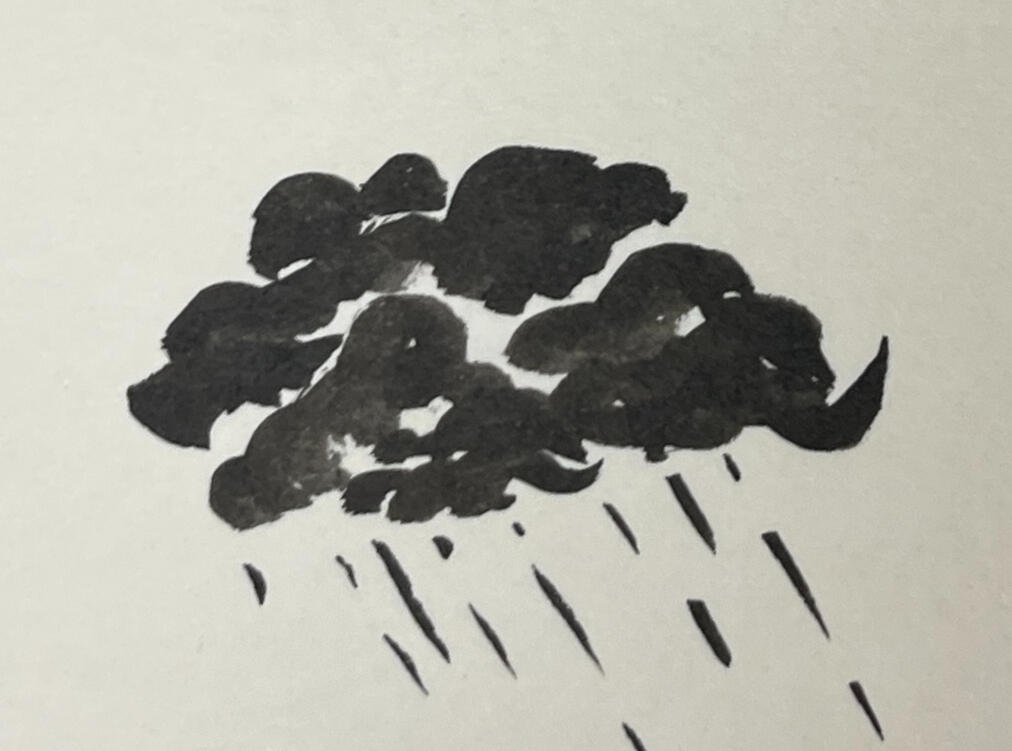
6. Gray Rain
The rain fell slanted, soaking the cluster of humans from the shins down no matter how tightly they pressed beneath the gray awning. Shoulder to shoulder, any jostling only threw those at the edge into the deluge. De might have been fascinated by their fear of the rain if she weren’t so annoyed about sharing the space. Though maybe they weren’t afraid of the weather so much as they were from the shrieking cries of feasting goyles. This kind of weather was perfect for them, rehydrating the creatures from stone as if they were shriveled grains of porridge.De curled around the ache in her own stomach and scratched a few new lines in her sketchbook. She would need to eat, but rainy days were few this time of year, and she desired most of that time to go to her art. With so many others hiding beneath her awning, space for her sketchbook was growing scarce.She pressed against those closest to her, head throbbing from hunger, but they only pushed back with more force. “Excuse me,” she hissed.Someone on the outside shoved harder. Her sketchbook tumbled into a puddle.Shrieking, she snatched it back. She let out her fangs when the pressing humans redoubled their efforts, anger overriding her sense, and was rewarded with bloodless faces. She knew her skin grayed when she did that, her teeth ached when they slid out of her gums and turned a punishing obsidian. The awning emptied in an instant, the screams sending a burning shot through her head. Ear to ear.Ears ringing, De sank on the bench. Without the humans, there was more than enough space for her to work away from the rain and on closer inspection, only the edges of the pages were wet. She peeled them apart with meticulous effort, but her eyes tracked the backs of the fleeing humans.

7. Swimming Lights
Oxygen hissed, stale and hot, into Stell's helmet. She baked in her suit; she was very near the sun now, but most of the heat that burned her came from the creatures that swam through the star’s radiated atmosphere. These “fish” for lack of a better term, formed and swam around stars like these like the fish of Earth swam in her oceans.She checked the cable running from the single remaining loop on her patched suit, a fragile line between Stell and her partner.Moxie floated at a distance, her attention jumping mistrustfully from fish to fish. Stell could only wonder how Moxie saw anything when her partner's hair filled her helmet entirely with brown frizz. In the same way that Moxie trusted Stell to watch out for new flaws in her suit that came with getting too close to the star fish, Stell trusted Moxie to use a hair-tie if she needed one. Moxie’s hands were poised on the cable, ready to reel Stell in if proximity to the fish burned another hole in her gear.Today, there would be no holes. No singeing. Today, she was going to capture a little swimming light.In one hand Stell hooked a magnetic plate. In the other she held a light. Getting near enough encouraged the fish to circle–attracted like a moth to a flame, or, she supposed, a star fish to their star. She held her breath, though nothing Stell herself did seemed to affect the schools of plasma. Even when she lifted the plate beneath it, the fish didn’t move away. It didn’t do anything but circle the light until she clicked the button that engaged the plate’s magnetic field.The field fuzzed, locking the creature in place. Pulsing. Hot. Stell turned toward Moxie, lips parting around a triumphant shout when her plasma fish exploded.It was tiny. A flash of heat. She hissed, dropping the light to inspect her suit for new holes.Moxie wanted her to come back. A small yank on the cable told her so, but finding her suit intact, Stell snatched the light from the vacuum and tried to attract another fish.“Field’s a no go,” she said through the com, her voice trembling only a little.“A fluke?” Moxie sounded as if she had to drag the words out. She would much rather Stell return inside and give up. She did not enjoy walks, but especially disliked the kind without solid matter beneath her feet.Stell reached higher, catching a second fish around her little light. This time, she didn’t try the field, allowing the fish to circle and circle her light as long as it would. She gave a little jerk on the cable. She smiled as Moxie hauled her back and smiled wider when the fish followed. It seemed to heat with each orbit, and though she couldn’t hear anything outside her own breathing, Stell imagined the heat of the fish emitting a soft sizzle each time it passed near her face. She heard none of that in the vacuum, but she thought it might hiss inside the station, hissing into her ear all of its carefully guarded secrets.
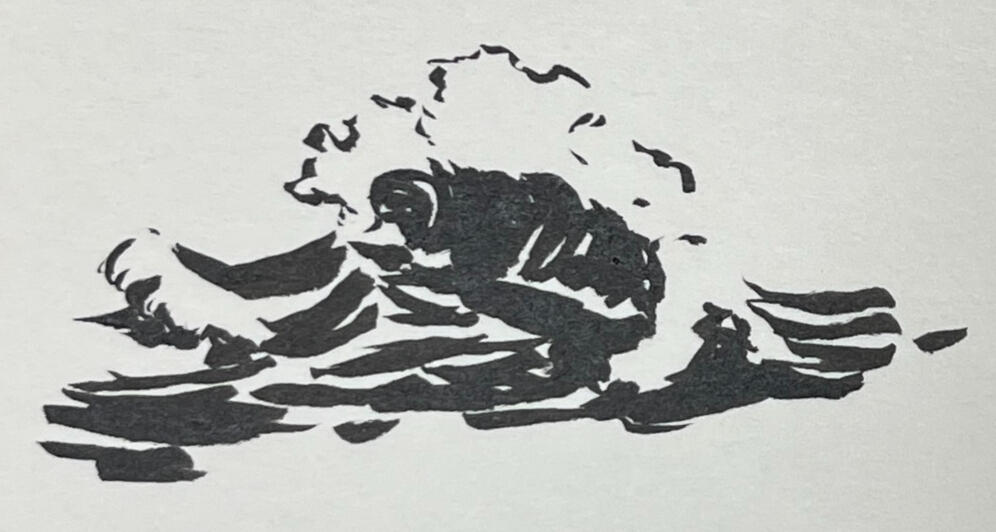
8. Banded Skies
She hasn’t felt much since she returned from that crystal world. That’s how she came to describe it: a kaleidoscope of refracted light that shone through her like a prism. She had been glass, maybe water, cold and shimmering in fractal pieces.The railing of the boardwalk creaks beneath her elbow as she crosses her ankles, watching the ocean recede. Flashing amber lights urge her to leave, but not so urgently as the tremor shaking up through the bones of her ankles or the roar like a freight train currently erupting over the water.When she stumbled upon that other world, pale yellow bands cut the sky in ribbons the same as now. Had that been at sunrise, though? Or sunset? She bites her lip, watching the water sink further, ignoring the pounding of her heart that tells her to run.As if running will make a difference now.The water comes in a rush: up shore, rolling over the beach and washing over the boardwalk below her. Still, fear is a tiny patter. Tears bite the corner of her eyes as she begins to realize that she left her emotions behind in that kaleidoscope world.The tsunami hits. Water rushes across the planks, over her feet, crashing against her ankles. It hits in a flash of cold and an enormous roar. The salt stings her nose and curls her lip, but only when it lifts her does that emotion strike: sweet, blessed terror.She shatters, every jagged edge a stinging wound. The pieces of her are swept up, shimmering in bands of yellow light.
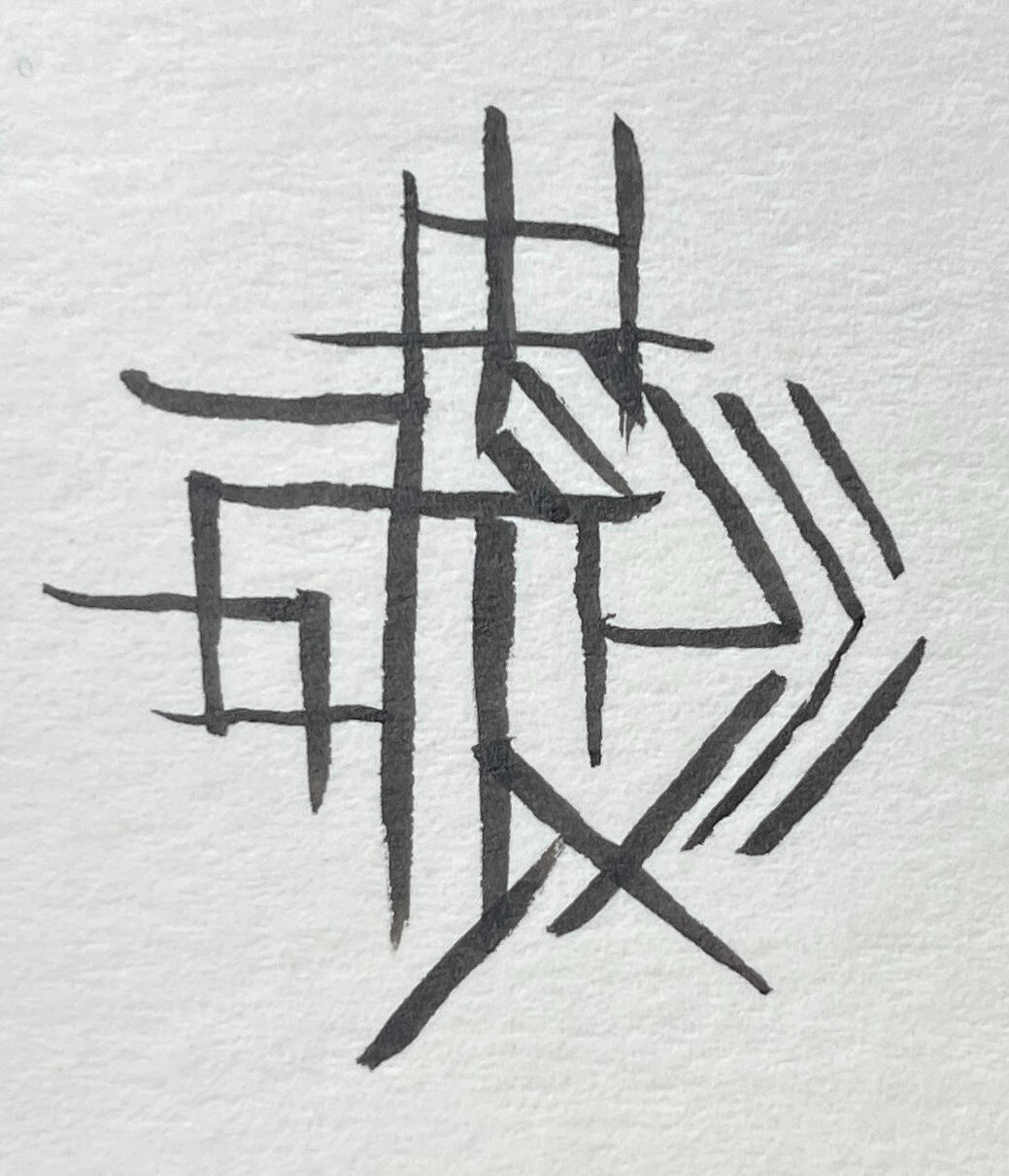
9. The Giant Ul
The caravan’s wheels crunched over stone, the load heavy enough that its passing rumbled up through the rocks. It was distant, threading its way through the chasm over one hundred feet below. The tremor still numbed Tuk-ul’s ankles where he climbed at the top of the ravine and instigated a phantom pain in his right hand where a landslide once crushed the small bones behind his palm. He climbed onto the shoulder of his colossus, giving no mind to the dizzying drop. The hair on his arms stood on end, but the ink on his back–bare to the sun–burned, giving him the giant’s power.It was more than enough strength to climb, and wedged as she was, Ul, Tuk-ul’s giant, didn’t need her strength to hold back the wall of stone. She held the rock fall off the wagon, the rocks pressing against her back. There were more unstable passages ahead, however, and only so many of Tuk-ul’s kind; he counted two others ahead, working to brace their own giants against the rocks.That left him…oh, half an hour at best to free his giant and place her further along the ravine.He picked a path across her shoulders on numb ankles, searching for the rocks that had settled and the rocks that had to move. When he thought he had it, he planted his palm against the stones and shoved. More than the one shifted. While the first went where Tuk’ul wanted, others skittered, rolling down the pile and over his colossus’s shoulder. He dove with a hiss, barely catching the largest of the rocks before it clattered over the edge.His arms wrapped not even halfway around the stone and a sharp rock dug into the sole of his foot. Sweat trailed from his hairline down the side of his face as he slid a glance toward his giant. Ul always had a glint in her eye, the sassiest giant Tuk’ul had ever met. He’d gotten used to reading her over their years of work. That glint told him that she wanted her power.Sighing, he shifted the stone, locking his heels in natural divots of the rock. With one hand free, he spun his cloak over his back, hiding the tattoo and returning the strength he’d borrowed.The resulting rumble sounded to Tuk like a chuckle as his giant shrugged the rocks off her shoulders. They rolled down–a new rockfall that fell behind the caravan. They would need to clear the road for the next series of wagons, but no one seemed hurt and Tuk was able to settle the smaller of the rocks in the crevices of the mountain with his own strength, Meanwhile, his giant pried herself from the rocks, dust puffing away in a dry shower as she did. Tuk stepped back to admire her, admitting that, however much he enjoyed the strength of his giant, he could never use her power as well as she herself.
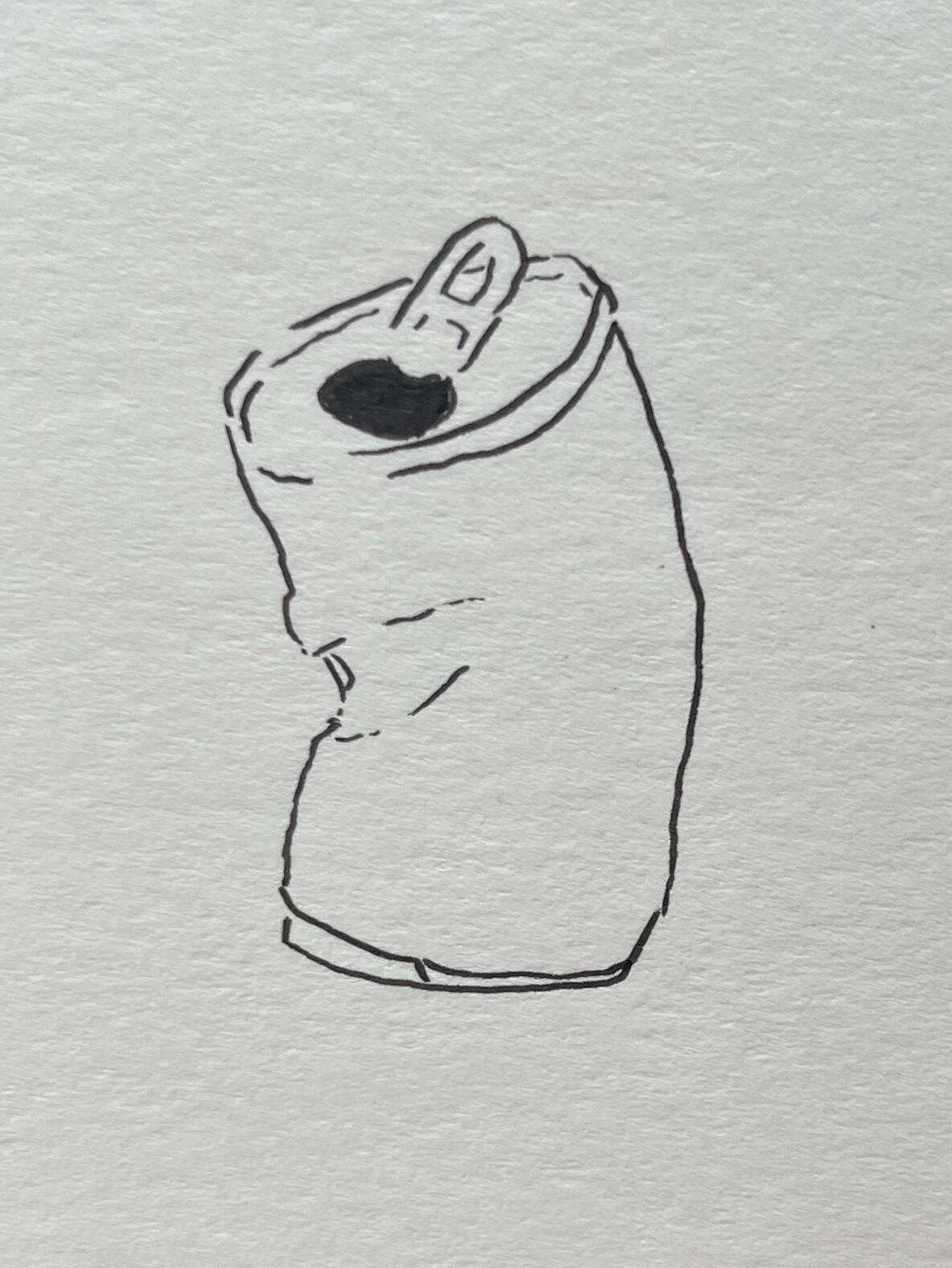
10. Sugar Rush
Soshu adjusted the pack of vendor goods on his shoulders. The cans inside: coffee, tea, and soda, clicked, drawing the eye of every monster in the dark.He lingered in a flickering bubble of lantern-light, staring at the last machine on his task list for the night. So far, he’d managed to fill all his machines without losing a single item to the creatures in the dark, and they were angry with him. Smoothing his thumb over the arm of his bag, he considered leaving something for them, a distraction in exchange for his skin. Unfortunately, his boss was also angry with him, and if he couldn’t manage one night without discrepancies in his stock, he would be written up. And then he’d live among the monsters permanently.Though he’d promised the monsters a reward at the end of his shift, a promise he had no way to fulfill, this time, when he approached the edge of the light, the darkness struck. Soshu leaped back with a yelp, the goods sloshing in his bag and carrying him off his feet. He scrambled to collect the cans that popped free, rubbing one dented edge with his thumb.Technically, they couldn’t sell this one. Occupational hazard of working while the shadows were about. He turned to mark the can as damaged on his handheld, but hesitated over the button. A picture would prove he wasn’t lying, but would this lose him the job?He pressed the button and rolled the defective can into the darkness.Then, he ran. He popped into the next bubble of light with enough force that he crashed into the glass of the vending machine. Behind him, the monsters cracked the can with a hissing pop.Soshu filled the machine with shaking hands and nervous, bubbling laughter. He dropped more than he placed, scrambling to snatch up each one. Many were dented. He didn’t care and he didn’t turn when the empty can he’d rolled to the monsters struck his shoulders and crumpled on the ground. Flattening the bag against his chest, making certain that not a drop of sugar stained his clothes, Soshu left the bubble of light.The monsters didn’t follow.
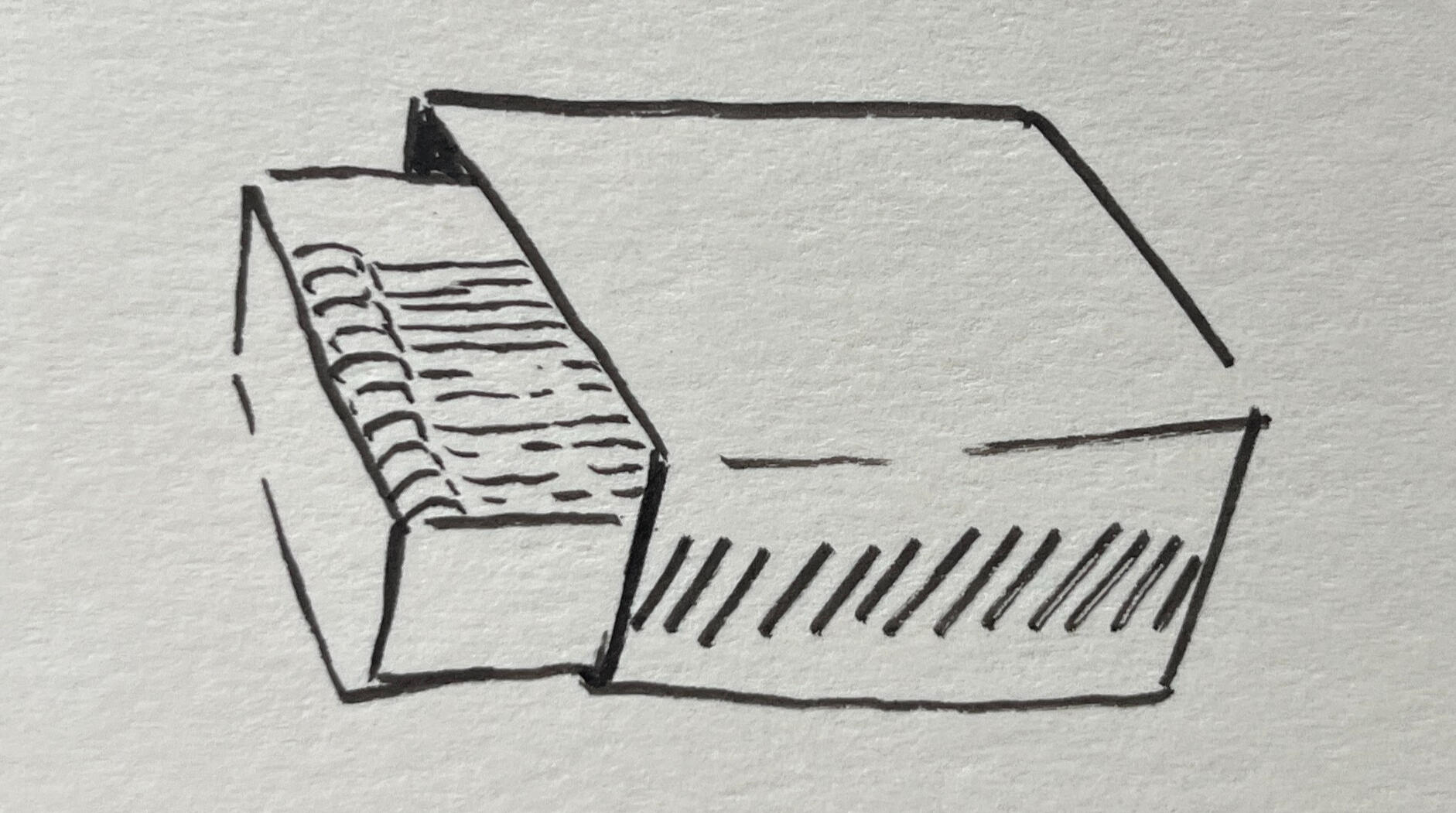
11. Little Flame
Familiar tingles crackled through her palm and up each finger every time she flicked them, but for the first time since Pira’s seventh birthday, this simple friction didn’t produce a spark. She tried again, this time with the other hand. Nothing. She dropped her hands, glaring at the orange jumper that marked her an official member of the pyromancer’s guild.She glared at the windbreak she’d assembled to protect her little fire, also shameful. It wasn’t even a good one; the air filtered around the cloth, buffeting her tiny, living fire even when she cupped her hands around its form.This was the last fire she’d created, springing from her fingers about a week back, just before the blizzard hit.It took her last spark, meaning it was cold, and as a certified pyromancer, of course she didn’t own a single match. She wouldn’t own one. Instead, waiting for the draft to ease and the flame to stabilize, Pira stripped, one arm at a time and dropped her jacket on the floor. Still protecting her little fire, she shoved the cloth against the gap in the door with the toes of one foot. She tugged the curtains next, leaping back when the rod jumped off the wall and clattered on the floor.She flinched toward it, but even that small motion left her fire exposed. It dimmed, its tiny hisses tugging at her heart. She flipped the oven on and tucked the little fire inside–jerking her hand free with a hiss when a brush with the metal burned her hand.Burned. A pyrotech.No one would ever hear about this.Letting the door slam shut, Pira sank onto the floor and leaned her forehead against the door. She peered through the little window, her orange jumper rumpled and smelling of smoke from her failed attempts. She shivered without her jacket–also unheard of–but she pressed against the oven, ignoring the sting of her burn as she watched her little flame dance.
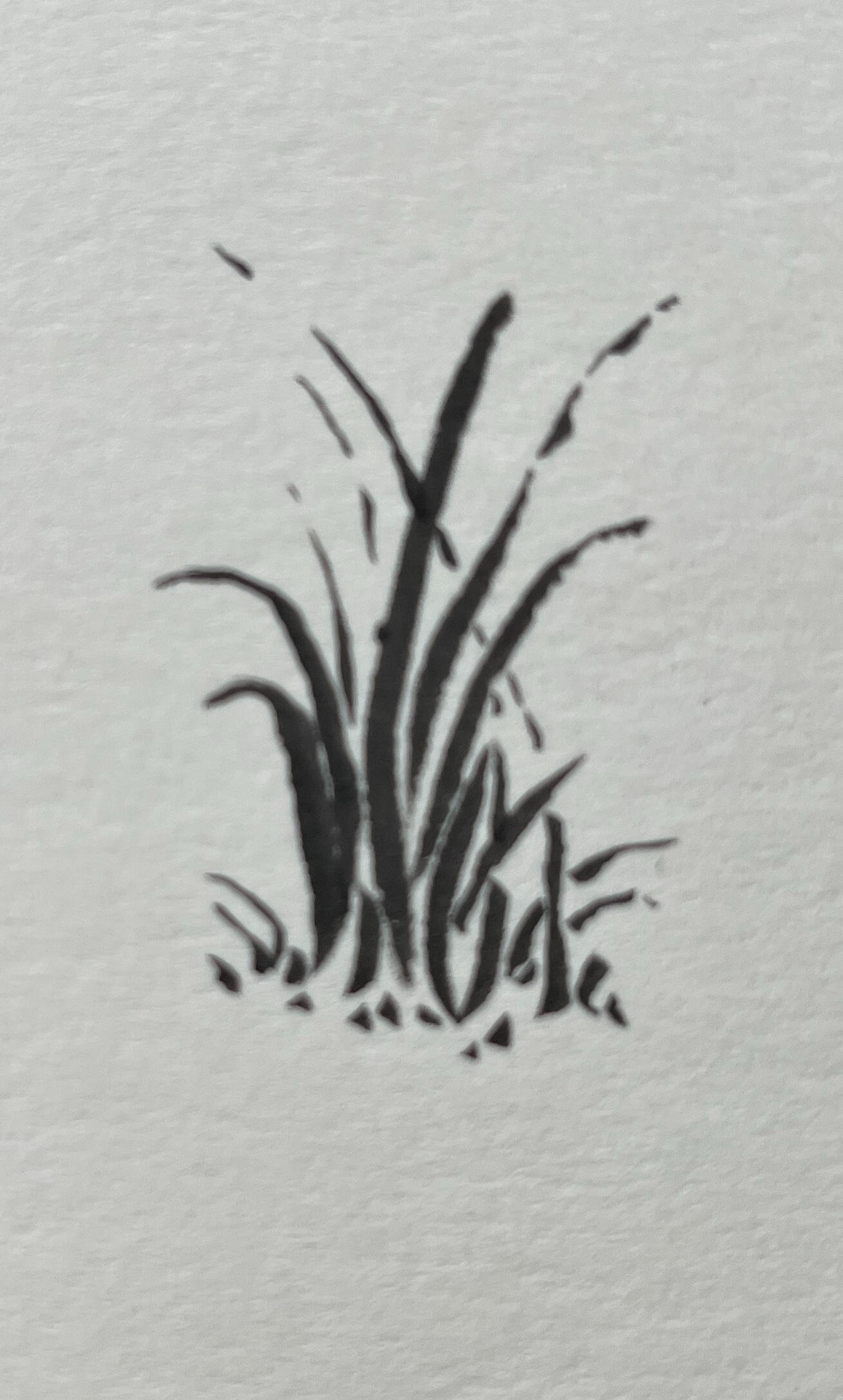
12. Trickling In
A trickle of water filtered through the ringing in his ears. The businessman lay on his side, so he saw the water next: a river rushing by, roiling and muddy. It tugged on his right foot until he pulled it free. He tried to blink away the haze to no avail and a raw dryness in his throat had him coughing. When the ringing didn’t subside, he patted his coat pocket for his cellphone.He fished it from his pocket with a frown. Hadn’t it been ringing? Wasn’t that what he’d been hearing? But he was on his way to work, too, so why was he in the grass on the riverbank? Why was he so cold?He groaned to discover that the sleeves of his blazer were shredded. In no universe could he ever show up to work like this. Wheezing, he teetered to his feet and squinted through the thick white fog. He couldn’t see, but he climbed the bank, his right shoe–the one that had soaked in the river–squelching with every step. The grass was similarly soaked, and he had to catch himself many times. One time he failed, sliding, then tumbling, back the way he came. He stopped in the spot he began, but this time he stared upward.Somehow, the cloud wasn’t obstructive here. He saw clear up to the bridge and the flashing blue and red lights. He saw his car, hanging half on and half off. Though it was hard to tell from this distance, he thought the window was shattered.Memory trickled in as hazy as the cloud that soaked his blazer. He swerved to miss a cycler, he even thought he succeeded. Everything else…everything else was missing. It all remained rather fuzzy until he reached for, and curled his fingers around a shard of glass, a piece of window that had followed him down.
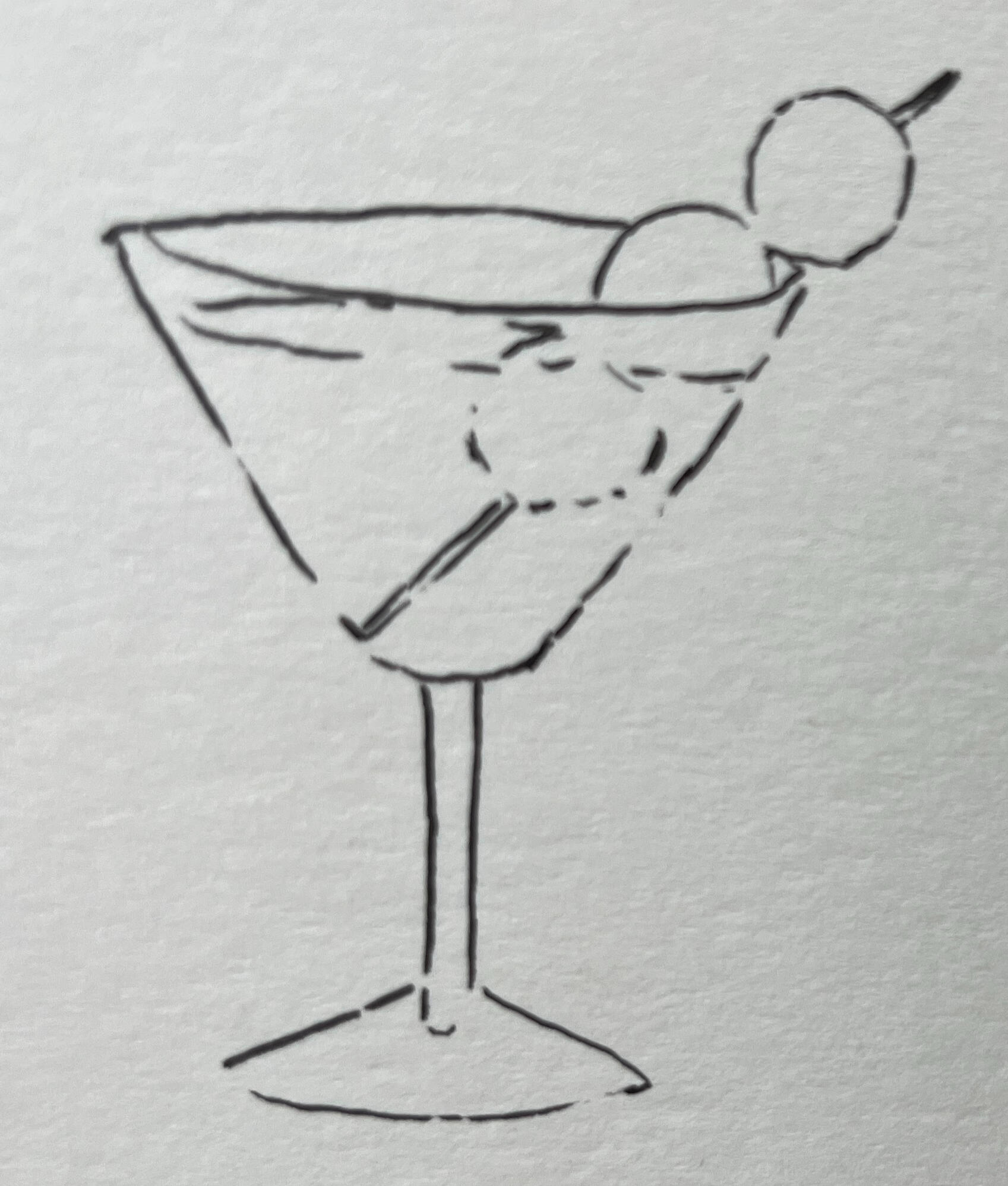
13. Maison de Lumière
I’m stuck in the uniform I died in: sleek black pants and polished shoes that still pinch my feet. The waistcoat maintains the crease I’d smoothed and smoothed until the moment the car crushed me against the brick wall behind Maison de Lumière. Ironically, the last thing I saw was my cigarette rolling down the crumpled hood of the monte carlo; my husband always said those things would be the death of me.I can’t breathe quite right. Even dead, my tongue tastes like the smoke from the engine, and my legs ache in a phantom memory of the fractures I died with. I can’t walk, trapped in an elegant, high backed chair as a customer of my own restaurant. This is a common sight for me; death likes eating here.He sits across from me in a tailored suit and tie, his hands clasped with unending patience on the white table cloth. He has a handsome face, but I don’t look into his eyes even when the fly leaves the rim of my glass to crawl over each of his fingers. No one stops by our table or glances at him even once, but he’s always in my periphery. As soon as I acknowledge him, I’ll be gone.I’ve been avoiding his eyes for weeks. Each day I do, someone else dies in my place.Today my husband and our adopted daughter came to Maison de Lumière to eat.They look tired. I study the dark rings beneath my husband’s eyes as he smiles and flips to the kids menu.Three more flies alight on the table cloth as I swirl my drink. When a server passes, I tip the glass, letting the fine crystalware shatter on the tile. The server pauses, and Death’s lip curves in a knowing smile. When the server notices the spill, they also tend to notice the flies. If they then notice Death, I’ll be free to “live” another day.And yet, there’s no flush of victory when I watch the server’s face pale. Self preservation has them pretending not to notice, ripping their attention back to the shards of glass scattered across the floor. The waiter cleans the mess and scurries off, but for the first time in weeks, Death doesn't follow.He leans across the table with a frozen smile. “If you don’t come this time, it won’t be that waiter who comes with me, but someone dearer.”I shake my head.Death doesn’t care. Death waits until I look up, meeting those fathomless black eyes. The darkness in them floods the world, fills the air with acrid smoke. The crushing weight presses against my legs. I drag air through my teeth, struggling between the fumes and the pain, but the last sensation is a cherry of heat searing against my cheek where I lay, trapped against the hood of the car.
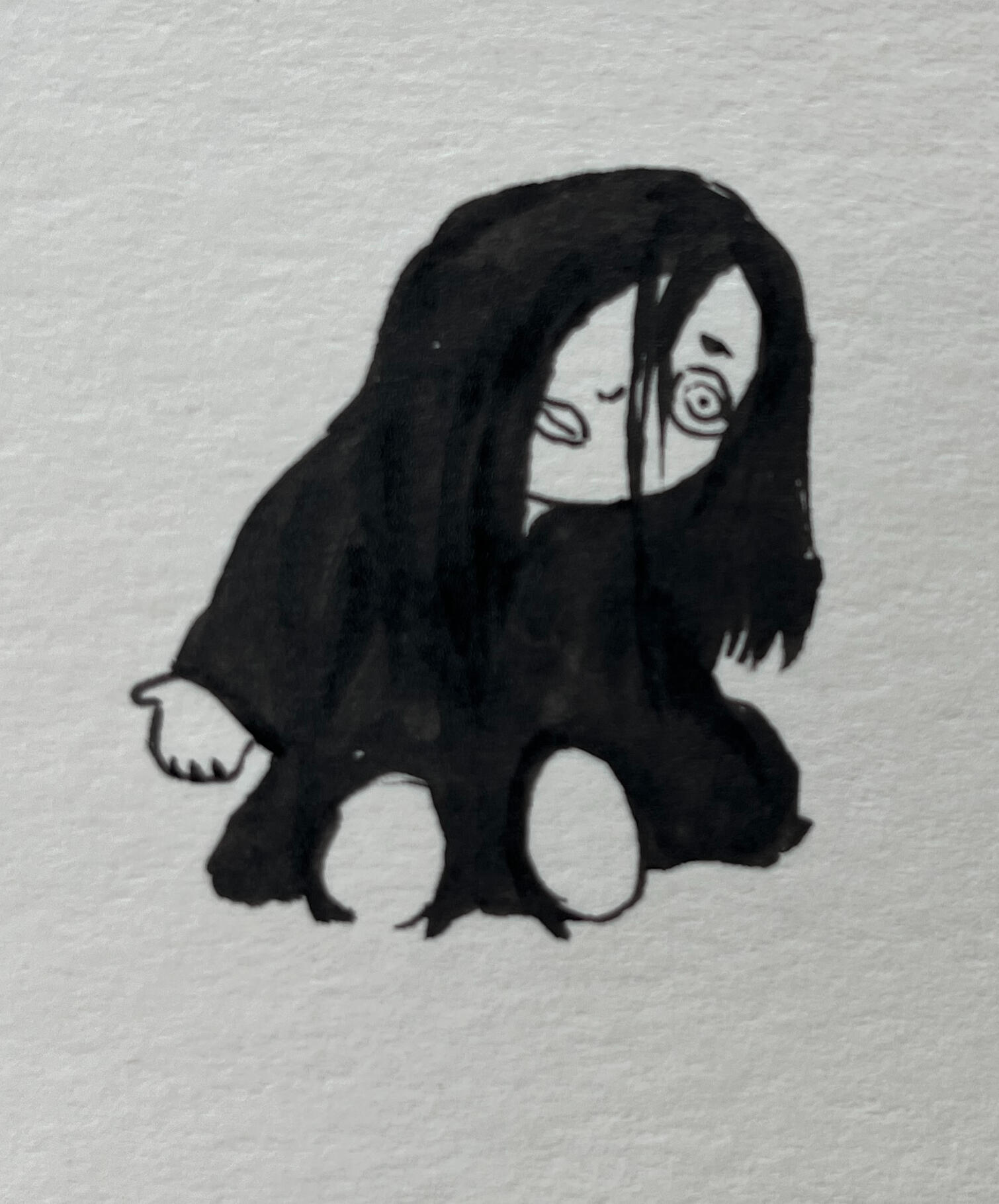
14. Tricks of the Trade
Nimi didn’t have anything to carry. Others following the trader dropped things or appeared monsters of rugs and tassels. She had nothing left of value but herself and her single, precious item. The master trader carried each of their most precious items in a trunk on his back. There had been no deception; he’d always been up front about his intentions: they could travel with and learn from him, but he would sell everything they owned. When he sold their last, precious item, they would lose their usefulness. Nimi would soon be left behind.She would belong then to whomever bought her precious item, like she belonged to the trader now. She loved him for all the things she’d learned. She hated him for all the things he’d done.“Let me buy it,” she begged him. It wasn’t the first time she’d done so, however.Like those other times, he didn’t turn to continue the conversation. He faced forward, taking them closer to the end with each crunching step. “With what money, Niminon?”Money was a trap. None of them had money. “Get me a needle and thread; I will mend your clothes.”“I can buy any tailor I need and a cobbler for my boots. Selling your precious item can get me those things and more. You can do those things for the person who buys you.”“No one’s going to want it; it’s precious only to me.”He didn’t respond. He was a successful trader and she had been watching him closely. He didn’t give away anything he could sell, and he could sell anything. So thinking, it surprised her when he said, “the woman we’re visiting next will see its worth.”The certainty of his tone shook Nimi. She closed her eyes and slapped her face as if to rattle new sense into her thoughts. The trader would be watching her. He knew what she wanted.Her mind was spinning, frantic, when the trader settled on a carpet at the center of an antique market spread. Nimi grew cold at the sight of the woman; a doll-seller and repair woman. She bent over her work as the trader and his line of followers settled among her wares, threading new hair into the scalp of an old doll. She didn’t cease her work as the trader unstrapped the trunk from his back and set it on the carpet between them.Wordlessly, he lifted Nimi’s precious item–a doll–from his collection. One eye was missing, a trifling problem to this woman, and the fingers on its left hand were chewn to stubs. The whole of its skin had been bleached from years in the branches of a tree, growing sickly and sallow as Nimi herself until one day the trader fetched it from the uppermost reaches.Nimi tracked her precious doll with greedy eyes, the ache from many scrapes and bruises pulsing in her knees. She twitched as if to dive across and snatch it from his hands, but stopped herself. The attempt would only get her a twisted arm.She knelt beside the trader as he offered her as a bonus to her precious item; she would not be separated from it, after all. When her time came, she smiled and bowed, her voice laced with liquid venom, “Buy me, and I will break every doll you repair, crush their parts and tear their clothes. I will hide them in full sunlight to destroy their color, destroying them as fully and completely as my own.” As a frown turned down the lips of the woman, Nimi turned to the trader. “If instead you spend the money you earned selling my other things to repair my doll, if you return her to me, I will help you.”Nimi had learned much in her time with the trader. His expression, first sour as she’d spoiled his deal, turned thoughtful. Nimi was his oldest collection, and having followed him for years, watching him sell each of her things in turn, she knew exactly her worth. She knew he wouldn’t be able to resist; the trader was a gambler as much as a salesman. In five, ten years, his own nature would spell his doom.
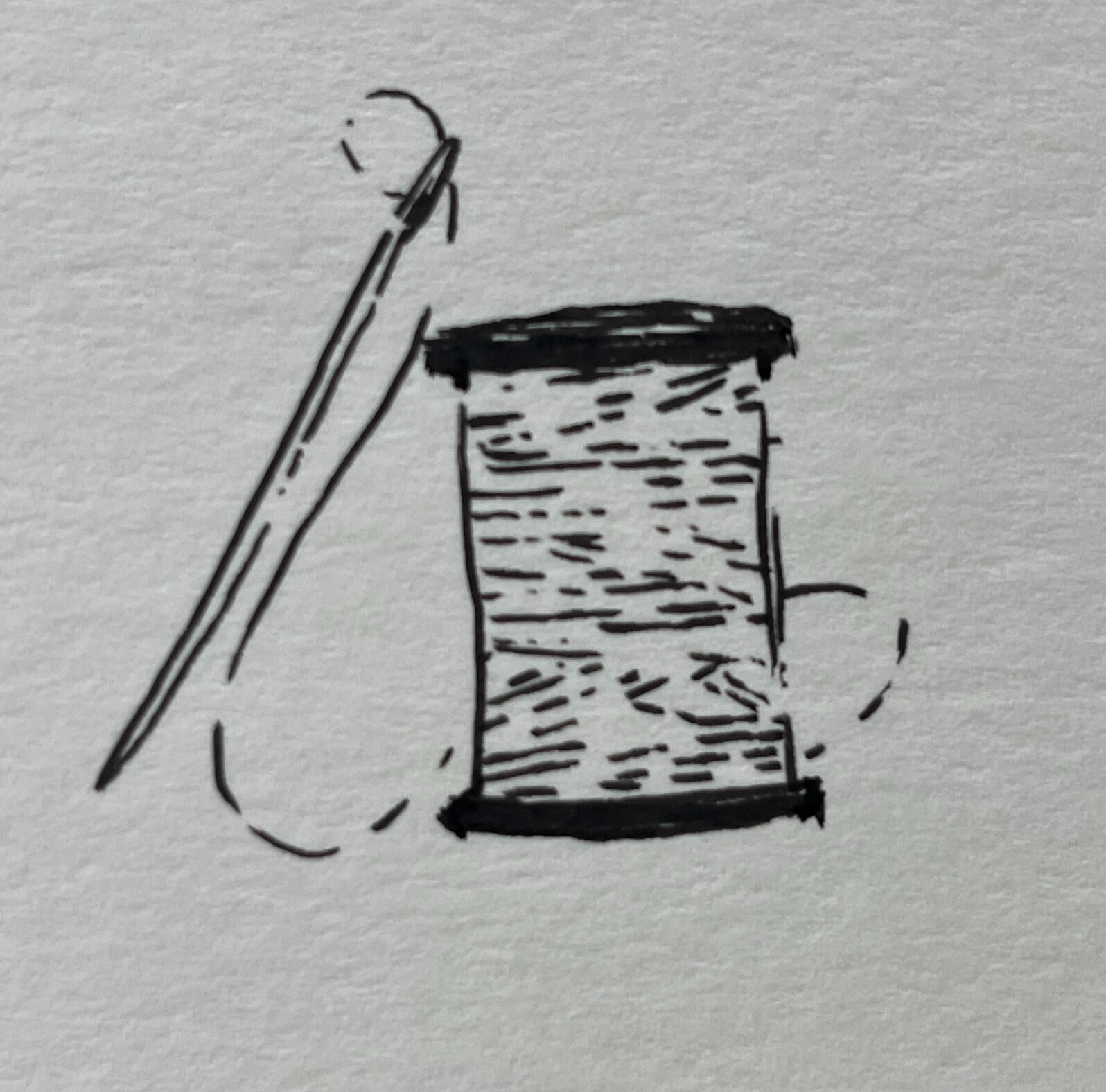
15. Hand-me-down
A shiver in the air had Lily digging for a jacket. She paused on the darkening sidewalk, arm lifted as she riffled through her bag. Her coworker was still nowhere in sight, and she was about to go home when her fingers brushed across a wrinkle. The coat lining the bottom of her bag was old and torn, but she had both thread and time. She leaned against a low wall, set her bag upon it, and pointed her frustration toward sewing up a torn seam.She couldn’t be frustrated about the coat at least: she’d torn it herself, five years old and trying to keep her home from work. She tied off the threads and moved to wrap it around her shoulders when she spotted a stain on the lapel.With a huff, she brought the coat into her lap again and scrubbed the spot with soft screeching marks of her detergent pen. Was it coffee? She imagined her mother must have gone through a lot of it working both early mornings and late nights. She dropped her work with a sigh, jumping when the settling cloth crinkled like paper.She slid her fingers along the seam she’d sewn and heard the crinkle again. Inside, a false pocket.Her mother had been a busy, secretive woman. Chewing her lip, she left the paper for now. She threaded her arms through the jacket, shivering with the gathering warmth. She collected her bag and crossed the street, her hand resting on that hidden pocket and its secrets as she did. An appointment? A world changing idea? A note to her daughter?Some things were better left a mystery.
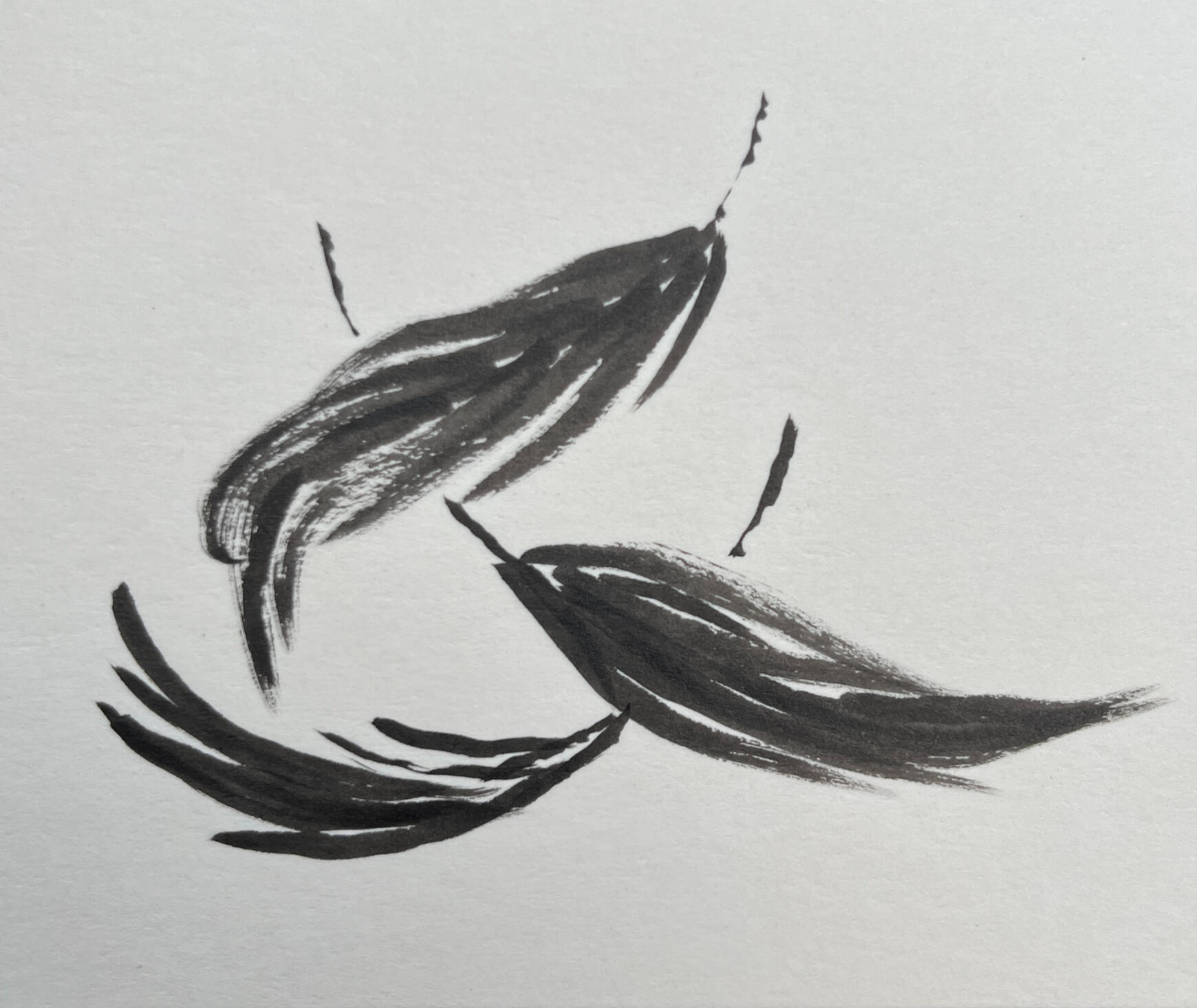
16. 01
Mark’s first mistake was wearing the green tie; it was vibrant and bold but also pukish in the wrong lighting (fluorescent) which happened to be everywhere he frequented these days. His second mistake was misplacing his work phone, which made for a frantic rush as he dialed the meeting code. He stepped through the conjured shimmer, still fighting with the tie, and flinched beneath a sudden burst of bright light.Not florescents. Definitely not florescents, and who forgot to turn on the dehumidifier? Mark cleared the spots from his eyes through voracious blinking and found himself not in the meeting room with bland swivel chairs and stained white-board, but beneath a canopy of trees taller than the city skyscrapers.He checked his watch. “A minute too early.”Damn.No matter, one of his buddies probably had an extra tie, and he could still make a good showing. He’d just dial up a new meeting code and be certain to step through at the right time. He turned to his phone to request a new code and froze, staring at the distinct lack of bars in the upper left corner. To make matters worse, lifting the phone in the hopes of achieving some reception encouraged a vibrant member of the local fawna to snatch his phone straight from his fingers.The parrot alighted nearby, his phone pinned between its claw and a low branch. Mark bent at the knees as if he might scare the bird through height alone and laughed at himself, fishing in his pockets for an old packet of stale crackers. He tore the wrapper open and lifted the crumbly offering, watching the bird’s eyes dilate to ovals and shrink to pinpricks. A few waggles brought the creature to his shoulder, its talons digging through his new blazer, but the phone was his, and tearing through a screen of vines, he found a single tower.“Again!?” was the response from IT, but a portal shimmered in a haze moments later. A sigh crackled through the receiver, “At the 01.”.Mark turned the phone over in his hand, watching the clock turn. There! He stepped forward, exclaiming as another burst of feathers crashed into the macaw on his shoulder. He stumbled away from the fighting into the portal and onto the rocking deck of a ship.He fell to his knees on the planks, ignoring the exclamations of the sailors, and with a wobbly smile, reached out one more time.
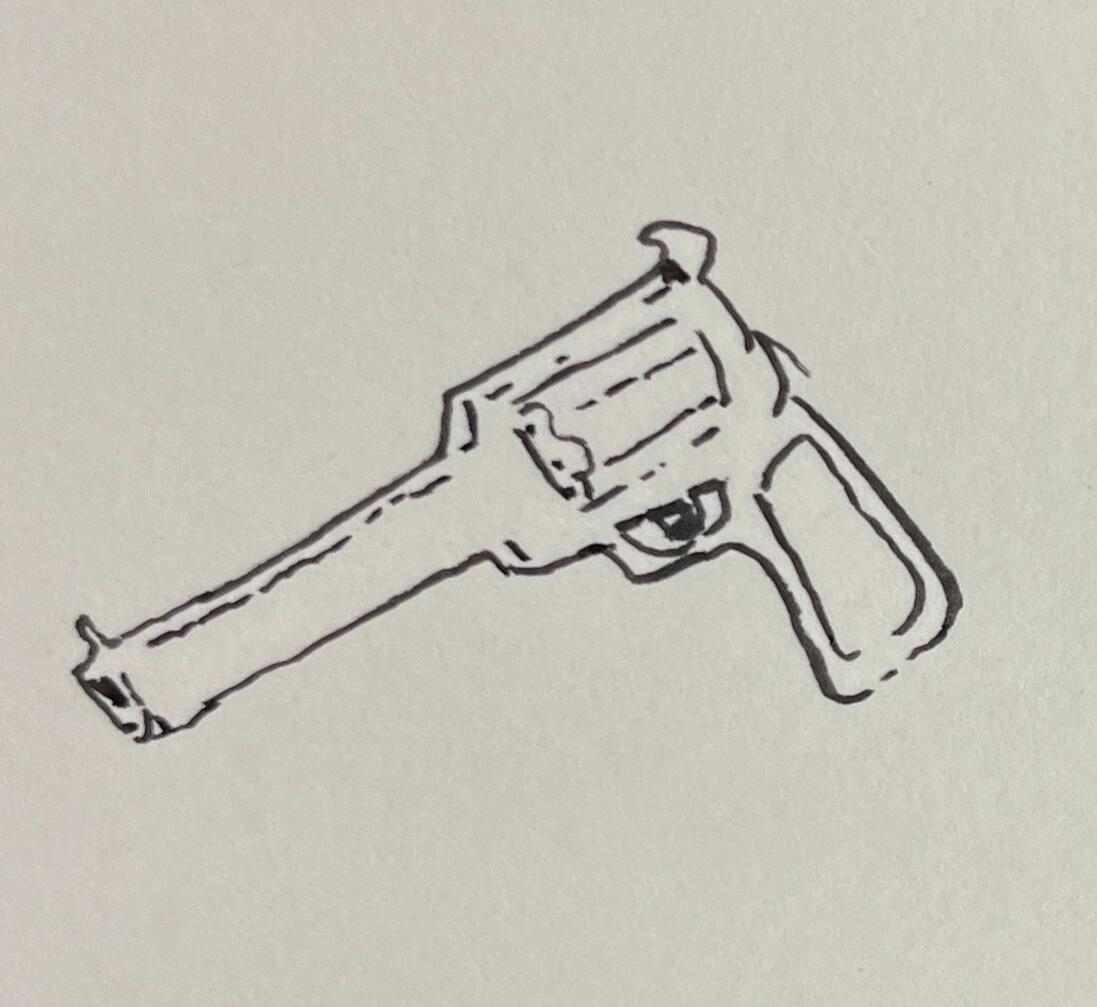
17. Cast into Crystal
Chei lurked in the shadow of an ornately wrought pillar watching the figures of light twirl over a mosaic of painted glass. The forms weren’t perfect: cast from crystalline figures spinning on turn tables at the edge of the sunlit gallery, the shapes were more gesture and shimmer than actual figures in dance, but the display was no less brilliant for the lack of detail.Chei twirled the gun around her trigger finger, safety on. She wasn’t a murderer, but by the way things were going, her sister’s kidnappers would make her one before the night was out. That was only true if she could reach them, however, and to do that, she needed information. All fingers pointed to the crystal gallery itself, but Chei had come to watch the colors dance for three days. No matter how she squinted or pieced the hints of shapes together, she couldn’t get a handle on the entire image.Not from the edge of the square.She couldn’t step out among them; first because she didn’t dance and second because, even if she could, someone was bound to notice the very real human woman in the midst of the color projections. The catwalks overhead were the most obvious solution, but they were crowded, the people there pressed against the bars, and each of them wore a patron’s pin, something Chei had long coveted, and now would never wear. Chei pushed through the crowd beneath the metal risers until she found a way up.She slid the pins from her hair as she climbed, training the curls over her lapel to hide the missing pin. She paused at the top, struck physically by a cloud of noxious perfume that stung her nose and set the world on its side. She clenched her teeth against a new throbbing at the base of her neck, but no matter how she shoved or shouted, the crowd didn’t budge. In fact, a tug at her waist told her she just lost her tools.Chei was a large woman. Though she snatched after the thief, they were gone before she could turn. Coming up here was a mistake. The patrons bumped and prodded, pushed and waved, each demanding for a better view if only because they poured more money into the project than any other. Chei could knock any of them on their ass, if only there’d been enough space for that.Instead, she lifted her gun into the air and flipped the safety off.The answering crack shattered the din. The sour tang of gunpowder hung in a cloud above her head and drifted down around her. Everyone ducked. Everyone screamed. Everyone ran.She stood her ground, buffeted by the fleeing patrons until she was steady enough to push to the edge and peer down on the gallery. She searched, ears ringing, but was horrified to find that below her was only half of the answer. She viewed the twirling images at sunset, but the figures made another pattern at dawn.Rough hands jerked her arm behind her, knocking her gun from her fingers and bending her arm behind her back. She dropped forward, lifting the man off his feet and tossing him over the rail into the wave of color below. Before the others could close in, she swept her gun into her hands and threw herself after the first man, the golds and reds burning into her eyes as she fell, cracking the crystal floor beneath her.Half the puzzle was more than enough. She told herself this over and over as she fled. She who had studied art for twenty years and appreciated it for ten beyond that, pieced the other half together by process of elimination.Chei found the studio where the figures were cast–no, turned to crystal and shot the five scientists…artists? around her sister dead. One half of her sister’s face was already frozen, growing translucent through whatever treatment the gallery artists had begun. For some reason, the tears flowed on the crystal side, but had already frozen in a hard shimmer on the other. Chei smoothed the tear from the crystal half, the chill of the stone numbing her fingers as she did. She marveled at the tingling in her bones, and briefly allowed herself to mourn the loss of such great minds. If only they hadn’t targeted Chei’s sister, for though it was terrible, even she had to admit the result would have been beautiful.
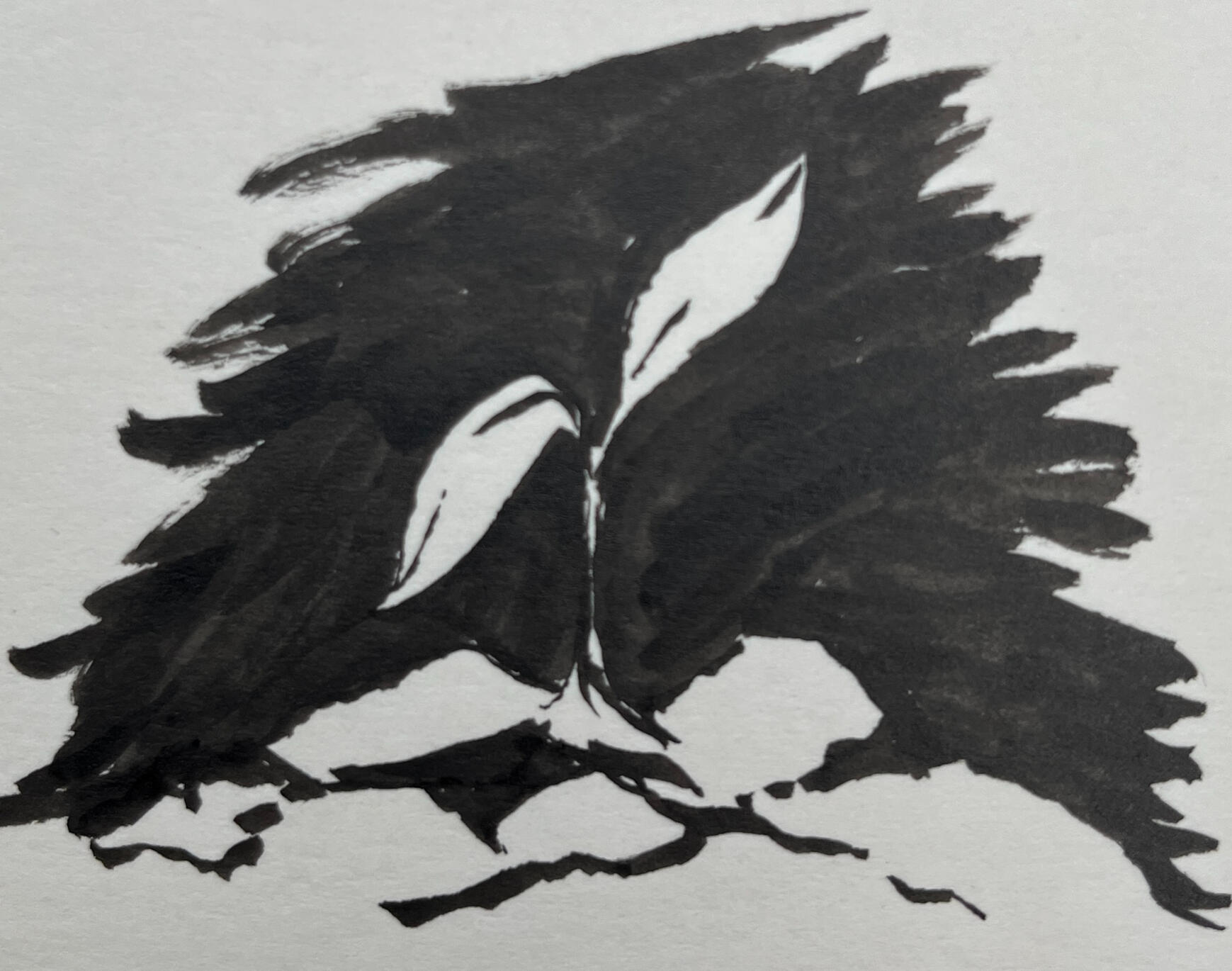
18. Yobito and the Deal
Yobito set his briefcase in the dust of the crossroads and laid out all the things he collected: a cube riddled with buttons, a charm plucked off the sidewalk, and a handful of stickers snatched–one from every coffee shop in town. He could collect things all over, but when it came to the deal, Yobito was stuck at this dusty crossroad at the edge of town. He cackled over his collection, certain the humans would love these–so cute! He settled the last sticker just so and straightened, spinning on his heel to accept his first customer––and watched a tumble weed blow by.He blinked, the smile clinging to his face for a count of ten, then fading as the little star sticker peeled away from his suit. He tapped his foot, scanning the road for his expected patrons. Surely the caffeine addicts would scent the essence of a coffee shop that clung to a few of his stickers. The century was almost up, and if he failed to get this deal, he would lose his little star.Still peering down all four directions, Yobito rubbed the sticker in place. It held. kinda.He was still turning, spinning at the center of the crossroads when his attention snagged on the lightning struck carcass of a small tree. He cocked his head, studying it. Life clung to a single budding branch, though the majority was cracked and scorched. He counted the paces to the roots and found it within the required footage for deal making.It wasn’t difficult to imagine what the tree might want, but how to convince the charred mass that the seedlings wouldn’t make it without him? He cocked his head. It was an arid summer, and a brief study of the sky revealed a deficit of clouds.A crooked smile bent his lips as Yobito laid a hand on the blackened bark. A twinge of a soul answered his touch. “I can’t save you”--the deal would rob the tree of its life. Once the soul left, the carcass would decay even more swiftly–“but I can use your energy to help the seedlings at your roots.”The tree’s answer numbed his finger tips. Yobito’s smile threatened to widen, but he coached his face into something approaching morose. “It’s a deal.”As he said it, he pressed a seed into the ground with the toe of his boot and opened himself as a conduit for energy. He kept only a little for himself: proof of the deal.He held onto the branch as the tree sagged. The colors grew dull and the few leaves that clung to life withered. He lingered until the last of the tree’s essence passed, then, with a whistle and a little pop in his step, he rubbed his little star back into place. He popped over to his briefcase, noticing for the first time the plethora of dying trees populating his t in the road.A constellation of stars winked into existence in his eyes as he clicked his briefcase shut.

19. Monste
Armen couldn’t bend his fingers, but he had to. If his grandfather, missing both arms and legs from the frigid temperatures in ‘56, wasn’t properly strapped in, he would tip out of the basket the moment the dogs took a turn. So Armen fiddled with the straps, pressing his grandfather against the basket to hold him still.His grandfather batted his attempts away with the stump of his right arm. “How can I slay the beast if I’m held down like a sack of spuds?”Armen could ask how his grandfather could slay anything at all, but bit down on his protest and tucked a sword against the old man’s chest. That, more than anything Armen could say, calmed him.Having succeeded in hooking only a single strap, and hands too swollen and cold despite the use of his best gloves, Armen left it at that and mounted the bar. He worked to squeeze the blood back into his fingers as he scanned the ice over the backs of his team, waiting for the shadow to pass.“Monse!” His grandfather shouted, pointing with the stub of his arm. Armen called the mush, dragging the goggles over his eyes as snow came up behind the dogs in a personal blizzard. His grandfather’s monse was fast, pushing mushers like Armen to take dangerous turns at terrifying speeds in order to keep up. Out of fear for his grandfather, Armen began taking less risky paths, but chasing the monse was his grandfather’s life-long pursuit, and he was dying.Today of all days, Armen decided to humor the old man, clenching his jaw and following the directions his grandfather pointed out with the stub of his arm. On occasion, the old man even called orders to the dogs, but his voice had weakened and thinned with age. Armen had to repeat all of these for the dogs.When his grandfather called an impossible turn, however, Armen hesitated. His grandfather gestured more insistently. “Take the turn, or we lose it!”Gritting his teeth, Armen obliged, leaning against the turn and feeling the leg pop off the ice. He strained, his grandfather shouted curses he’d never heard before.They hit the ice.His grandfather hung from that single strap, dragged along when the dogs didn’t stop. Armen gripped the bar, torn over razor sharp ice and rock. Snow piled in his face and filled the front of his jacket. He spit ice, fighting to call the halt as his grandfather flailed to reach the basket.Armen dragged himself nearer, hand over hand. The dogs were slowing, but not fast enough, and his grandfather was tumbling, his thin skin bruising and tearing over the ice. Armen reached for the rope that held him, but while he fought to return his grandfather to the safety of the basket, his grandfather chewed the rope that bound him.Armen had to let go of the sled to grab him, prying the rope from the old man’s jaw and slicing it free with a knife. They rolled together over the ice. When they settled, his grandfather shoved him back with his stubs, turned on his belly, and gave the ice three solid thumps.He stared at his grandfather. The old man had finally lost his mind—But the monse returned, its great shadow swirling beneath them. Its shape grew as it rose, and armen climbed to his feet, reaching to pluck his grandfather out of its jaws. But its rise only cracked and lifted the ice, setting their sled on its skis.Armen scooped his grandfather off the ground and replaced him in the basket. He didn’t strap him in, hopping on the bar and calling the mush as the shadow again streaked away from them. His grandfather shouted, the joy of the hunt clear in the gravel of his throat, but Armen found his attention split, staring at the back of the shadow beneath the ice.Never in his wildest dreams would he have considered that his grandfather’s monste enjoyed the chase as much as he.
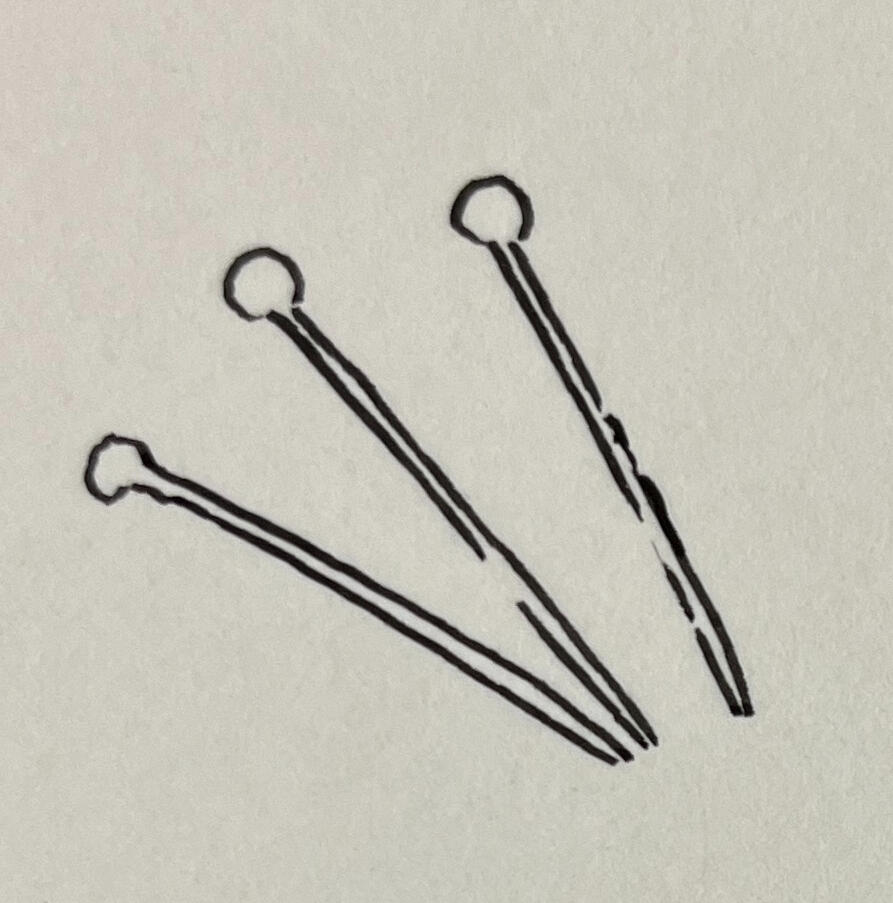
20. The Last Gambit
Grai was cursed. Cursed with ill luck that kept his tailor business in the mud, and cursed with pale skin. Five minutes trapped on display with his models between the blinding sun and equally blinding cement was enough to burn. And no matter what they said, lobster red did not flatter him, even when he wore a mix of jade and pomona green.He used the last of his money to book a six by six square on the market grid for three hours. Noon was all he could afford even then meaning the models he brought needed to work for free. He had two excluding himself while most others had six or seven. Larger names like Jeadrik had at least a dozen, all draped in fabric upon fabric: thin undershirts, vests, coats, and over those elements were often trains of cloth that trailed like wings from each shoulder blade. The fashion of the moment was in layers.And it was hot.Grai’s models, brother and sister, billowed their clothes. Cursed with Grai’s same affliction, their cheeks were flushed and sweat dripped down the sides of their faces. Though he sympathized, Grai resettled the folds of their outfits with a chastising click of his tongue. Though he tried to display his own wardrobe to passing nobles, he was often distracted, reaching to steady his sister when she teetered, or catching his brother’s arm with the sleeve of his rich coat midway to his sweaty, greasy face. If this went on, Grai would be little more than a decorative stand propping up the unconscious bodies of his siblings for the noble’s viewing pleasure.With a sigh, he slid the outer jacket off his sister’s shoulders and lifted the train of cloth off his brother’s head. He donned both himself, ignoring the smirks of the tailors tucked comfortably in the shade. They waited apart from their models, ready to take business proposals as they came.Grai’s own spot of shade was empty by necessity. He only hoped he didn’t lose business simply because interested nobles failed to find him.He would simply need to work both floors.For two hours Grai twirled and strutted, hawking his cuts until his voice was hoarse, shooting darting glances to his canopy.Once, his frantic juggling coincided with a wash of vertigo. He checked his canopy mid spin as the wave hit him. Black spots pressed in at the edges of his vision and he fell. To his horror, he didn’t strike cement. Instead, he fell in a heap of twisted cloth into the arms of a passing lady.Her expression was all astonishment, but no one could be more astonished than Grai; most would have let a heat exhausted model hit the pavement. A wash of shame hotter than the sun flooded him as he regained his feet, fluttering the end of his train in an abashed apology.“I should advise you to work on the design of your shoes,” said the woman above his bowed head. “If you lose your footing so easily.”Grai’s head spun, but with a twitch of his fingers, he lifted the hem of his trailing coat. Modeling fashions for both genders, he’d decided to wear heels.As he hoped, the noblewoman laughed.“See something you like?” He asked. Perhaps the heat exhaustion was making him bold.Again, she laughed. “Perhaps not the shoes…but the coat. I’ve never seen anything like it.”Was it the heat making his head spin like this? The richness of her perfume? There was an uncomfortable prickle against his skin that warned him he might be burning. He straightened with care, spun the coat around her shoulders, and pinned it to fit. It was only when he bent a knee, lifting the hem off the cement, that he recognized the uncomfortable prickle.Tucked in the shade of his canopy, there could be no doubt that Jeadrik was staring at him. No. Glaring.That look, more than anything else, reassured Grai that he had done enough. The relief was more necessary even than water on a hot day–or maybe not; as soon as the feeling washed over him, he collapsed.
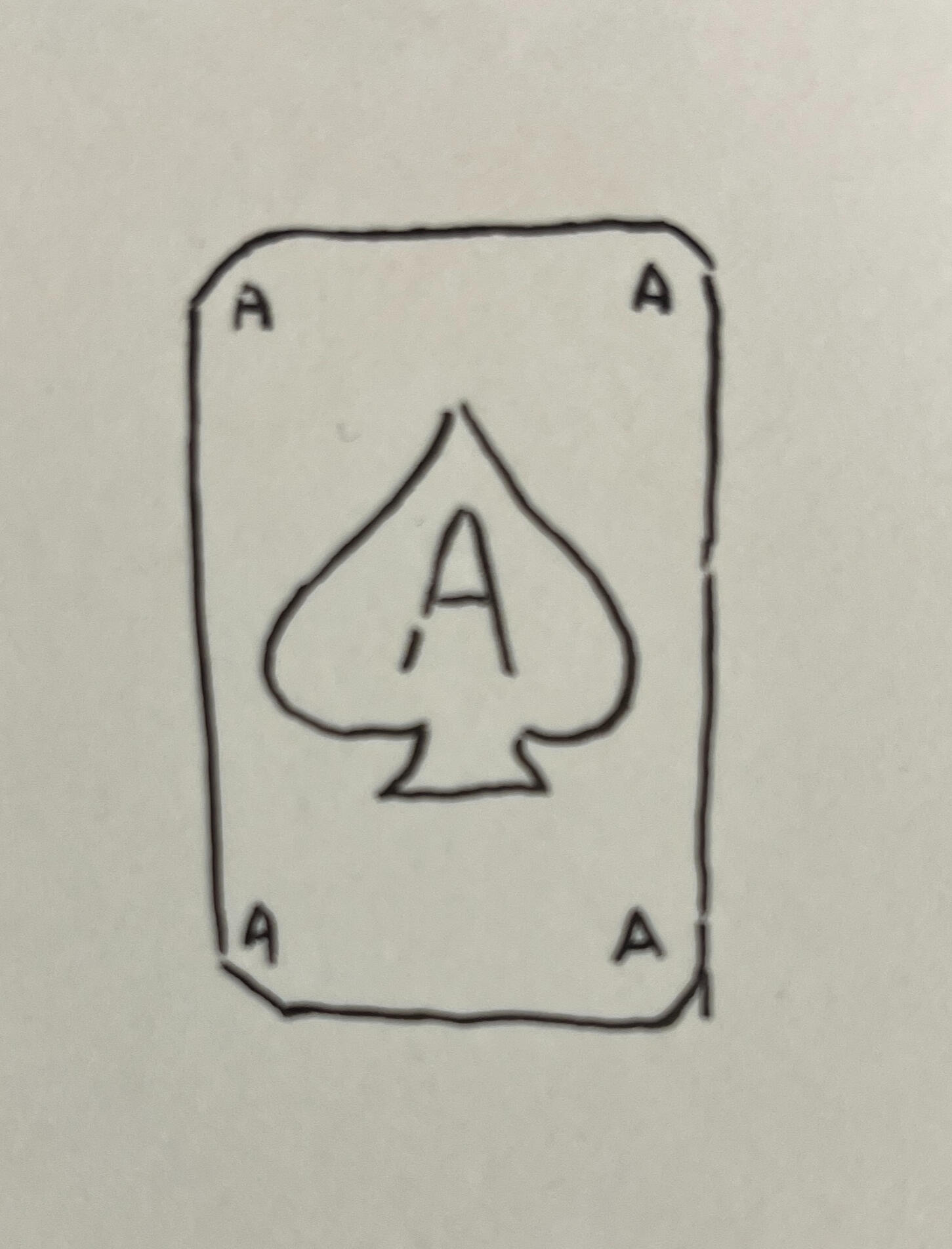
21. Crumbled Houses
When he’s not setting charges in the tunnels, Kjell builds houses in cards. It’s their work that destroys the crypts after all; the spirits needed somewhere to go, a fact proven each day they delved deeper. The faster they moved, the more charges set, the more unhoused spirits spilled into the tunnels. The houses, even houses of cards, kept their darkness away.Kjell hasn’t been successful in some time, and the unhoused spirits now crowd his table as smoke. The smog dries his throat and a headache grows behind his eyes. Each time a new blast shakes the tunnel, his house falls. Each time his house falls, the alcove grows a little darker.Kjell rubs his nose with the back of his hand.He’s out of coffee.Well, that isn’t strictly true: the majority of it was spilled over his table from a blast that shook the floor sometime about ten minutes ago. He rubs his fingers together, trying to remove the sugar. They stick to the cards, and placements that should be easy end in a tumble of white and red. He drops his head in his hands, groaning when his fingers stick to his face.He pries them away and freezes.Laying flat in front of him is a single house. Two walls stand to either side and two slanted cards make a roof. It would not work if it stood, but even flat against the table,e the shadows seem to recognize the shape.Stomach sour from anxiety and caffeine, hands still sticky with sugar, Kjell lays out more flat houses. He makes ten. Twenty and watches the darkness thin. The sting in his nose lessens. He allows himself a moment to marvel at his discovery before moving the houses into a quiet corner in a scramble. Since these houses will never fall, he takes his time returning to his seat.He settles, taking in his surroundings for the first time in months. He plucks his cup from the table and leans back to enjoy the dregs of his coffee.Heck, he could make another cup.
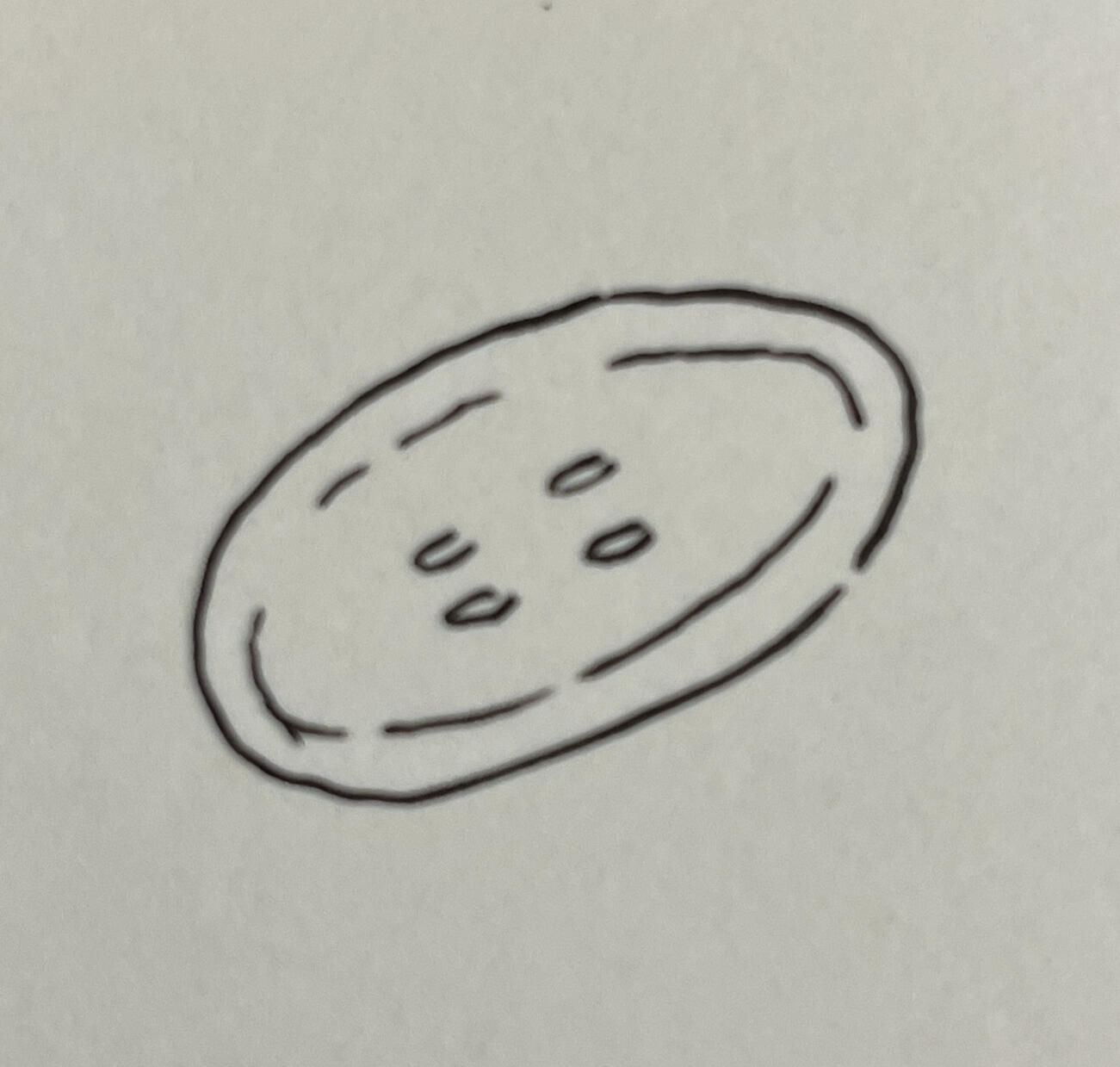
22. Conjured Rain
The woman Alis derobed would smell like compost when she woke. Even Alis smelled a little like old grounds and ripe fruit and a button had torn free of the servant’s uniform–now Alis’s uniform–in their brief but chaotic struggle. Ordinarily, she might take the time to sew it back, but her brother’s clouds were thickening. Any moment they would open up and flood their fields, washing away the town’s hope for food this winter.Unfortunately, she had already been turned away once from her brother’s office. About important matters of state, he was not, under any circumstances, to be disturbed. Even by his own sister.Not for the first time, Alis wished that the manor staff where her brother worked weren’t so strict in following his wishes.She reached and entered the manor easily enough. Her new servant’s uniform allowed her entry, but inside was a bustle of activity: secretaries scribbled furiously at their desks, cleaning staff scrubbed, dusted, or otherwise directed others. There was repair work taking place in the old kitchen.Hunching her shoulders, Alis cut through the direct center of the chaos, making a beeline to the door she knew would lead to the stairwell and her brother’s office and the third floor. Her haste worked in her favor at first, but manor management caught her at the door and jerked her by the elbow toward other work.“He won’t be disturbed,” they said with a tut. “Not even for tea, until one o’clock.”Trapping a sigh behind her teeth, Alis allowed management to lead her away. She watched the clouds thicken through tall windows. She stole glances through the vent at the top of the wall when she was deposited in the manor’s working kitchen: a set of hastily erected tables and portable stoves. Whatever he was dealing with, her brother was working himself into a storm.Whatever the servants thought, he was, in fact, in need of interruption.Alis couldn’t afford to spend any time here. When management left, she followed. Outside, the wind had picked up: bending most trees nearly in half. The first rain pelted the windows, drowning out the shouts of the other serving women. One of them caught her wrist, but she twisted free, she cut across the main parlor, flung open the door at the back, and dragged herself up the stairs when her legs grew tired.She was gasping, hair undone and wild when she broke into her brother’s office. She watched her brother’s face turn red with frustration when he recognized her, then puzzled when he noticed her clothes. He clutched the pen so tightly she thought it would snap between his fingers.“Get her out.” he was already returning to his paperwork. “I’ll be done in ten minutes.”“In ten minutes, the crop will be flooded.” She resisted the hands that restrained her, took her brother’s papers and threw them at the window.“You–” his eyes locked on the clouds. His face blanched white. “I haven’t been working as long as that.”“And yet you’ve conjured a storm, and the fields are drowning.”With an effort, he forced the storm to brighten. The rain let up and the wind died down. The sky turned from a wicked coal black to a dreary gray. It would fade naturally from there, but she was far from satisfied. “You need to take breaks.”“It won’t happen again.” Though she didn’t trust his promise one bit, her brother at least looked adequately sheepish when he gestured to the papers scattered across the rug. “Any chance you could help me collect the papers?”

23. Nightmare
This is going to end badly.First, Gwen was out of dream skein, and second, even though she wanted to, she couldn’t get more. Her discharge from the military three months ago lost her that privilege. As her dream catcher turned black, she begged her commander through letters for even six feet of the nightmare catching threads.No reply.What could she expect? Dismissed on charges of madness, they’d rather lock her up than treat the problem. Or maybe they dumped her in the real world assuming she’d manage to function despite the madness. They probably thought she’d manage to at least buy groceries.Whether or not she was made was debatable, but Gwen definitely struggled with shopping. Her dream skein was dripping nightmares, meaning one or more of them were likely to follow her to the general store.There was at least one. She could tell by the storm of blinking yellow lights outside the shop window.Fireflies.Who knew why the nightmares attracted them? Even in the trenches, the bugs would light up the infected like a floodlight. It was hard at the best of times to remember that others couldn’t see the lights. Even harder to decide if the lights came from the nightmares or actual fireflies.Mood soured, Gwen settled her purchases with the clerk and faced the window. A twisted figure stood within the blizzard of winking light, one arm shredded, each of her teeth glowing through the lack of skin. A blast had ruined half her face, leaving a permanent smile from ear to ear.Gwen knew the face well, both the perfect and the ruined.She leapt the counter and fled down the back hallways. Two false turns distracted her before she came upon the back door. She burst through it, shoulder throbbing, into a swarm of yellow light.Three figures waited outside.She spun again, colliding with the attendant. Gwen pushed inside and slammed the door behind her.The other woman jabbed a finger down the hall. “We’re closed.”Gwen searched for some kind of weapon, snatching at an umbrella as the attendant pushed her out the front door. Though she reached, she only managed to topple the basket on the floor.The door clicked behind her and the sound of the locks engaging followed shortly after.Hugging the bag of cans and produce to her chest, Gwen faced the twisted nightmare of what had once been her best friend. Sweat sprang to her skin. Her heart beat against her ribs.Her friend made Gwen swear that she wouldn’t let her haunt her like this. In that way, Gwen had failed. And yet, wasn’t it inevitable?A victim of nightmares always became a nightmare for someone else.
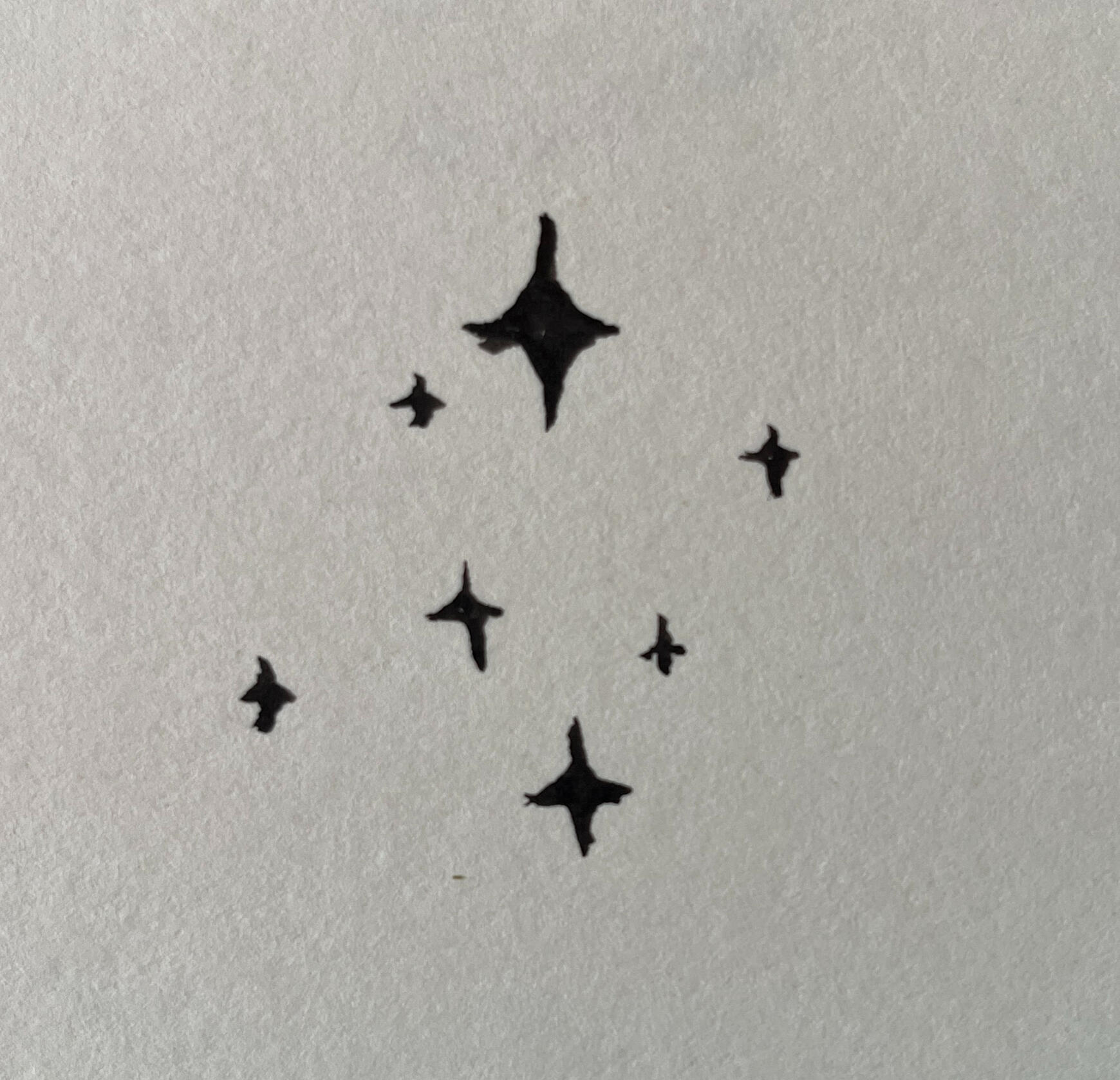
24. The Eldritch Elegry
The energy shoved Elegry like a physical hand. Impatient. Disrespectful. She would gather them up and shove them deep into the core of the world if she weren’t in such a hurry. A millenia or two of burning would reveal how good they had it here with her, and she’d be able to use the energy itself to travel anywhere or anywhen she wished, but the energies weren’t satisfied. That left Elegry in need of a horse.Unfortunately, being eldritch, she was faced with two possible reactions from animals: they would hate her, or love her.Approaching the stables revealed the first to be true of the horses, which kicked and snorted and otherwise protested, and the second in the stable hand, which was inconvenient. She didn’t slow her approach, though the horses shied from her hand. The human boy stared with a glazed expression, drool leaking from one corner of his mouth.Worse, the energies continued to fight her. Unable to hold them in place, both the horses and stable hand probably caught glimpses of her true form. This made the boy even more useless to her. Mind destroyed, he fell to his knees and slumped on his side, leaving her standing in the stable, a saddle and tack in her arms, without the faintest idea of how to use either.She spent all of a minute fiddling with the elements before discarding them entirely. The energies were still lashing out—shoving her, toying with her hair. They nearly shoved her off the horse as she pulled herself up.That, she thought, was it.She shoved back, suddenly and sharply, barking at the energies like a hound to her pup. Her true face slipped when she did, but the boy had already lost his mind anyway.She reeled it in, twisting the mane of her animal as the energies fell into a shivering line behind her. They were cowed, but she wouldn’t use them now. Children who obeyed only after a scolding did not gain her attention.And the horse was a novel means of travel. One she doubted she could use for long.
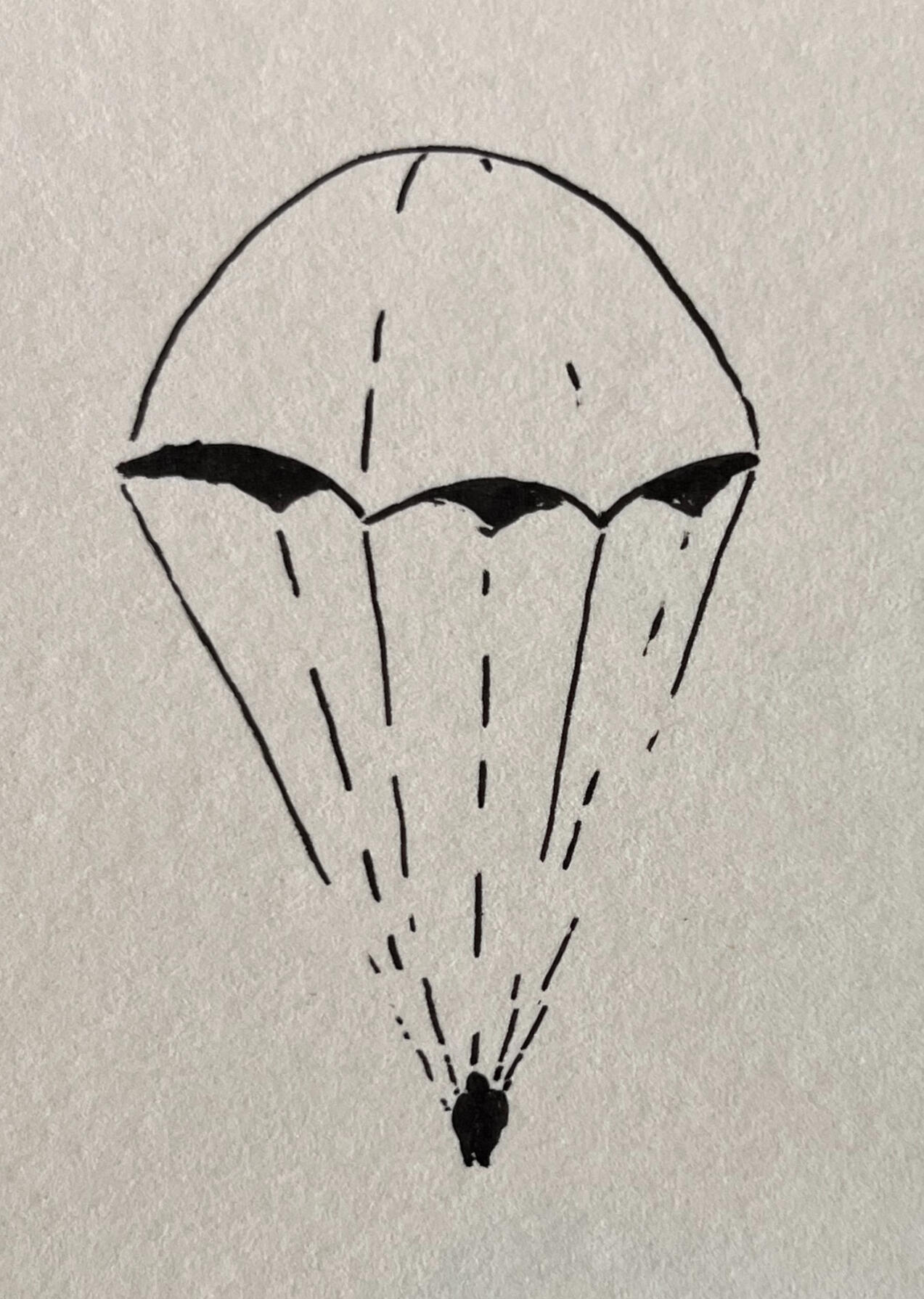
25. Mayday
A burning projectile crashed through my outbound mission and the pieces now tumbled in the stratosphere. There had been a blip, an intake of breath through my earpiece from ground control a moment before it hit. Shot straight through the other side.The blip warned that signal between me and control was lost, but I issued mayday, mayday, mayday, as the rocket turned end over end. The G forces trapped me against the wall. I dragged myself toward a hole, intending to throw myself out and pull a parachute, but before I reached the break, black fuzz washed across my vision.Tensing. Squeezing the muscles in my arms and legs brought me back in time to recognize a hole in the clouds. I caught only glances, the clouds twisted, the water vapor dragged down in a spiral toward the earth. It was difficult to tell through the spinning, but I thought there was more than one like this: at least half a dozen clouds torn down by falling debris.On one turn, I spotted pieces of the thing that fell. Burning and twisted lumps of metal from our satellite. The one I had been about to repair. One more spin revealed one of these pieces headed straight for my tumbling wreckage, but I was already mid leap, shoving myself with both arms away from the turning wreckage.I was caught in the snap when the pieces collided.I cartwheeled, numb pins and needles tearing through my legs. I got my fingers into the release of my parachute and tugged. The cloth jerked me painfully away from the rocket.What followed were the most relieved and peaceful ten seconds of my life.I drifted. Chilled by the wind, watching the wreckage grow smaller below me. At the eleven count, a final chunk of the fallen satellite caught my parachute and towed me down after the rest.
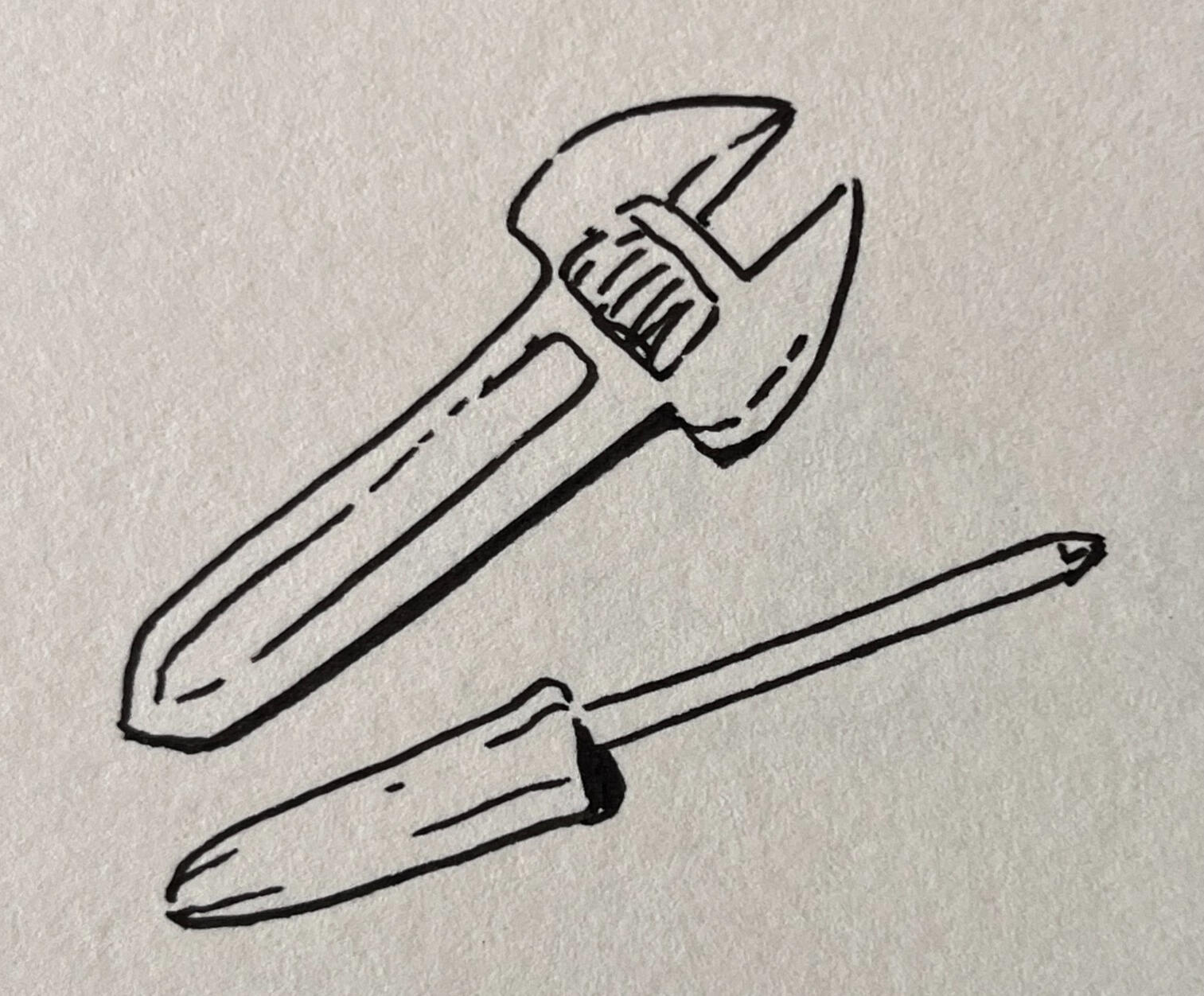
26. The Most Forgettable Invention
Where was her other shoe? No. Winnie was certain she’d been searching for something more important than that. In fact, she had gone to a great many places without shoes. Perhaps she’d been looking for something to do with her latest invention?After all, she had the work order right in front of her. The client wanted a machine or some kind of medicine to calm their mind and help them sleep. Or rather, the report said that they couldn’t stop thinking and therefore couldn’t sleep.Quite befuddled, Winnie rummaged around her workshop, searching for something to jog her memory. Perhaps she had been looking for the last piece to her machine–it had to be. The device on her workbench looked too complete for anything else.She twisted back to her invention.Frowning, Winnie returned to her seat and twisted to face the item she’d been working on. I did in fact appear done, though it lacked the sort of polish she applied to finish most of her work. Her rags sat in a pile to one side as if she were about to start that process, so why hadn’t she?She skimmed over her notes and poked around with the object itself until she heard a soft crack. She froze, inspecting the mechanism for damage when she gained a sort of Deja vu.She did this before and was only now remembering it. Because…because…Because she had made a device that made people forget. Temporarily. Just long enough to fall asleep.Winnie threw her head back and cackled. She’d quite forgotten, but now that she remembered, she could truly appreciate her own genius.
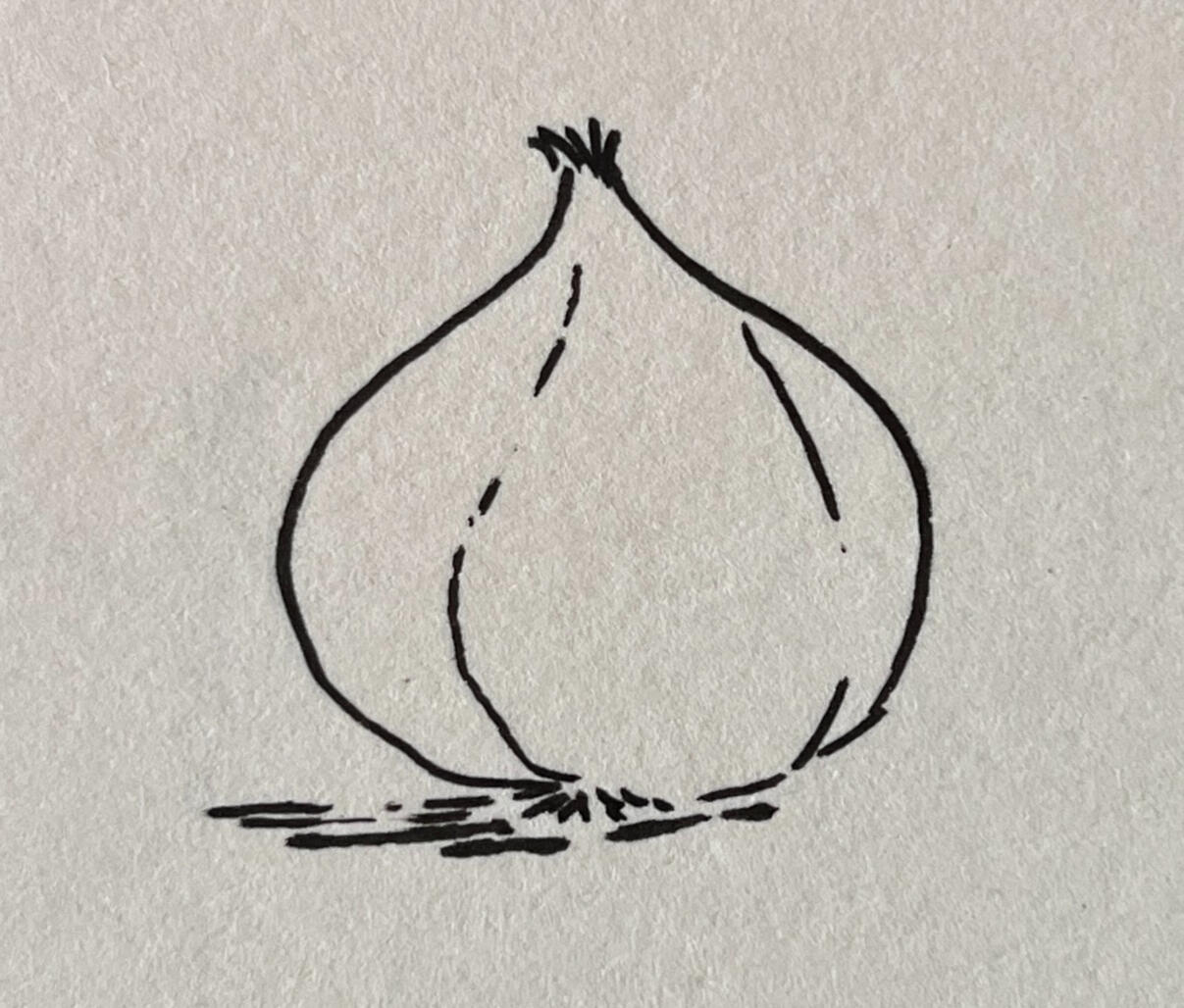
27. Monster Garden
The vampires lurk at the edge of her garden. Pim wonders with a trickle of fear if they smell her failed attempts at garlic, or if they’re here for other things. She grows everything: monsters for the queen’s military, food for the people, onions…onions she grows to sell, but her current patch is ruined: dug up, she suspects, by the local dog.The only thing Pim failed to grow was garlic, which is unfortunate, as it’s the only thing that can ward off her debtors.With a tentative sniff, the vampire takes a step into her garden.Though sweat trickles down her spine, she lifts the flat of her hand to stop them. “Wait! I’m working on a new monster for the queen.” Her mouth is dry and she struggles to swallow. “One more step and they’ll drag you under the soil.”The vampire doesn’t buy it. “If that were true, why not let it have me?”“What would that do to my reputation? The queen will settle all my debts once we’ve won the war.” At least, Pim hopes she will.Vampire considers her. Taking not another step. “That’s true, but the war might last another decade. I need my money now.”Searching her face, the vampire continues across the garden. When no monster rises to drag him under, he arches an eyebrow.“Huh,” she says weakly. “Back to the drawing board. Or I suppose, the greenhouse!”Though she turns, the vampire catches her shoulder and spins her back around. From the pocket of her apron, he scoops the last of her garlic seeds.This makes his eyebrows climb yet higher. Pim pales as he closes his fist around his findings. He tows her after him, and though she’s hopeful that the queen will spare her for now, she’ll need to start her hunt for the vegetable all over again–being more careful this time, as her debtors will be watching.At least she can laugh now, for though the seeds themselves aren’t poisonous to them, they do make her captor sneeze at least five times.
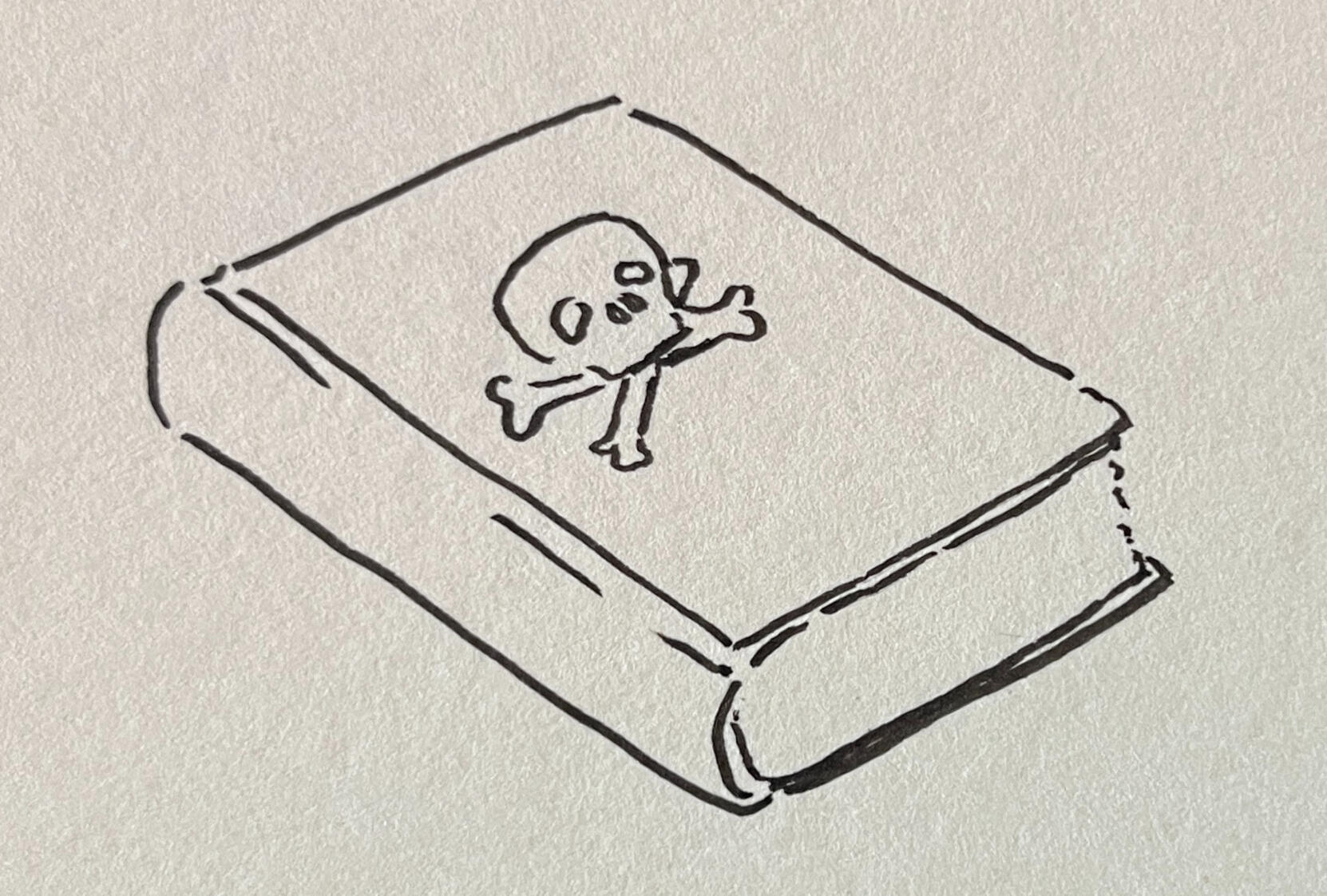
28. The Dred Battalion
A bone aching chill reached through Dred’s arm and spread throughout her body. She shivered, tugging her sweater tighter and curling her legs up in her chair as a second shudder wracked her from head to toe. Her reward was another skeleton digging itself from the grave ahead of her, but that was only number five of her skeleton battalion.The dark lord was scheduled to arrive within the hour, expecting at least fifty of her thousand, but rather than find more bodies as Dred bid, the skeletons she did have were bickering.Apparently, the few she chose to raise hated each other in life. Unfortunately for her, they seemed to hate each other in unlife, too.As their creator, Dred could command their silence, but that would only last a single, blissful moment before they regained free will mostly because she was tired and commanding them required deliberate focus. The moment she returned to raising the next of her army, they would be free to leap at each other’s throats. Which they did.Dred sipped at her wine, searching for the sweet spot between pain relief and mind fuzz. When the clacking of their bones and the grinding of their teeth became too much even for her wine aided mind, Dred sent the five of them afield to play–which meant they would hunt and kill small creatures.Eh.Dred tipped back in her chair, balancing the glass of wine on her knee and the necronomicon on the other as she spun in slow circles in the center of the graveyard. The clicking, bickering chatter of the skeletons dimmed, and she began the incantation that would raise the next of the dead. She was halfway through the first page of text when a small rodent clawed its way up the back of her chair and threaded itself in her hair. She struggled, the wine tipped into her lap, her meticulous phrases dissolved into unintelligible shouts and curses.That same cold sensation returned, shivering through her spine, but then it was all around her too. Sunlight bled from the sky, leaving a murky darkness and the metallic scent of waterlogged caves.The shadow realm; home of decaying souls and bodies ripe for the plucking. Only these souls and necromancers even brushed this place. Being here in the physical was almost certainly a result of her botched spell.She had no idea how to get out, and she sank against the cold stone. Relieved.The dark lord would never find her here.
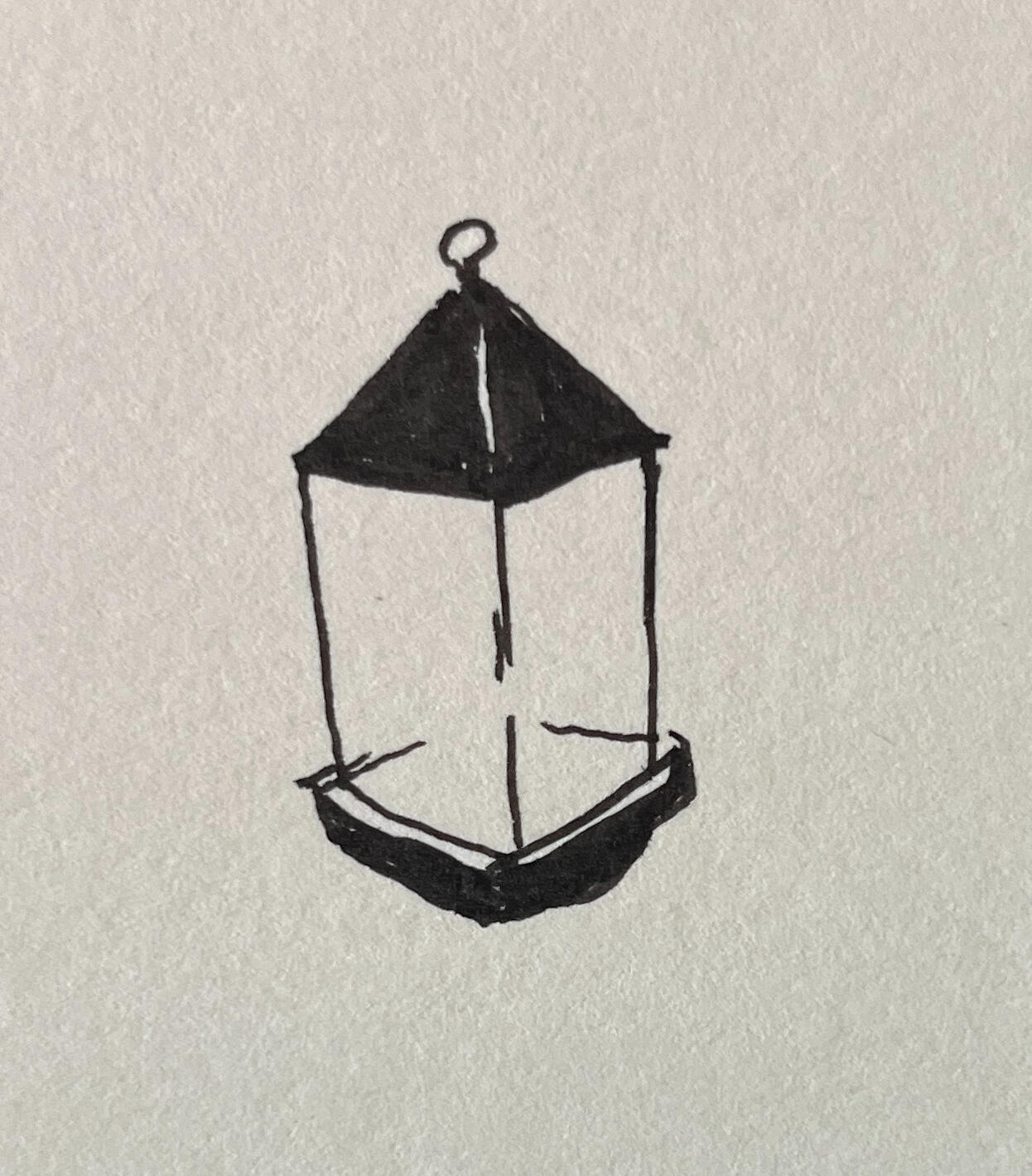
29. Breo Learns to Write
Breo hid himself and his writing in the crook of an alley. On his left were the bins where a sour cloud of vinegar and milk waited to sting both eyes and nose; he ignored the path to his left. He watched his right side, though. Every now and then, a guard passed the alley, and though only half of them glanced in his direction, he flung his jacket over his tiny open flame each time to hide the light.You see, Breo was, until very recently, illiterate. Breo also desperately needed to write a letter.The rebellion would get him out if he told them how. Trick was learning the words to do it without tipping his hand to the only guard sympathetic enough to teach him a few words.And then there was the struggle of not getting caught by others while he practiced.Ptera showed him only five characters tonight. She did so during her shift, meaning she had to leave long enough to show her face on her rounds. With her gone, Breo was vulnerable, but he was also free to try out the characters he really wanted to know. Ptera had explained that writing required a person to find the right combination of meaning and sound. She’d taught Breo five of eight of the most basic phonetics, and he’d been teaching himself the other components by the warnings tacked up around camp.He needed input (it was difficult to know for instance if he got the slant right on the character just there which would indicate left or right). Directions were important, he didn’t want to send his rescuers to the wrong side of camp and get them incarcerated just the same.Numbers were also tricky, and he had absolutely no idea how he was going to indicate the character for “guard”. Maybe he could use the term “other?” He was puzzling it out, writing and erasing and writing again, forming new words based on the pieces he thought he understood.He became so absorbed that when Ptera appeared beside him, he turned over the flame lighting his work. He caught up. The scratchy fabric of his jacket whooshing hot and fast.He stripped, tossing the burning coat in the dirt. His shirt followed a second later. He was still stripping, the flame singing his skin, when Ptera lifted him by the belt and vaulted him into the bins and their terrible concoction of liquids. It put the fire out, but those same liquids infiltrated his nose and he lost the small amount of food they’d given him for dinner.Worse, he was certain she had made some sense of his intentions. He’d been so absorbed, he’d lost track of time. He’d been so focused on crafting his message that he hadn’t noticed her until it was too late.Except, she didn’t draw her firearm. She toed the lantern back in place and snuffed the flames that burned over the cobble and oily dirt of the alley. She paused over his writing as he dragged himself from the filth, dirty, singed, but otherwise unharmed.The commotion drew others, which Ptera turned away even when they saw the things Breo had written in the dirt. He picked his way closer, certain he’d failed until Ptera turned those fiery eyes upon him. She knew what he’d been trying to do, though the others seemed to think nothing of it.After all, why would a servant learn to read and write?
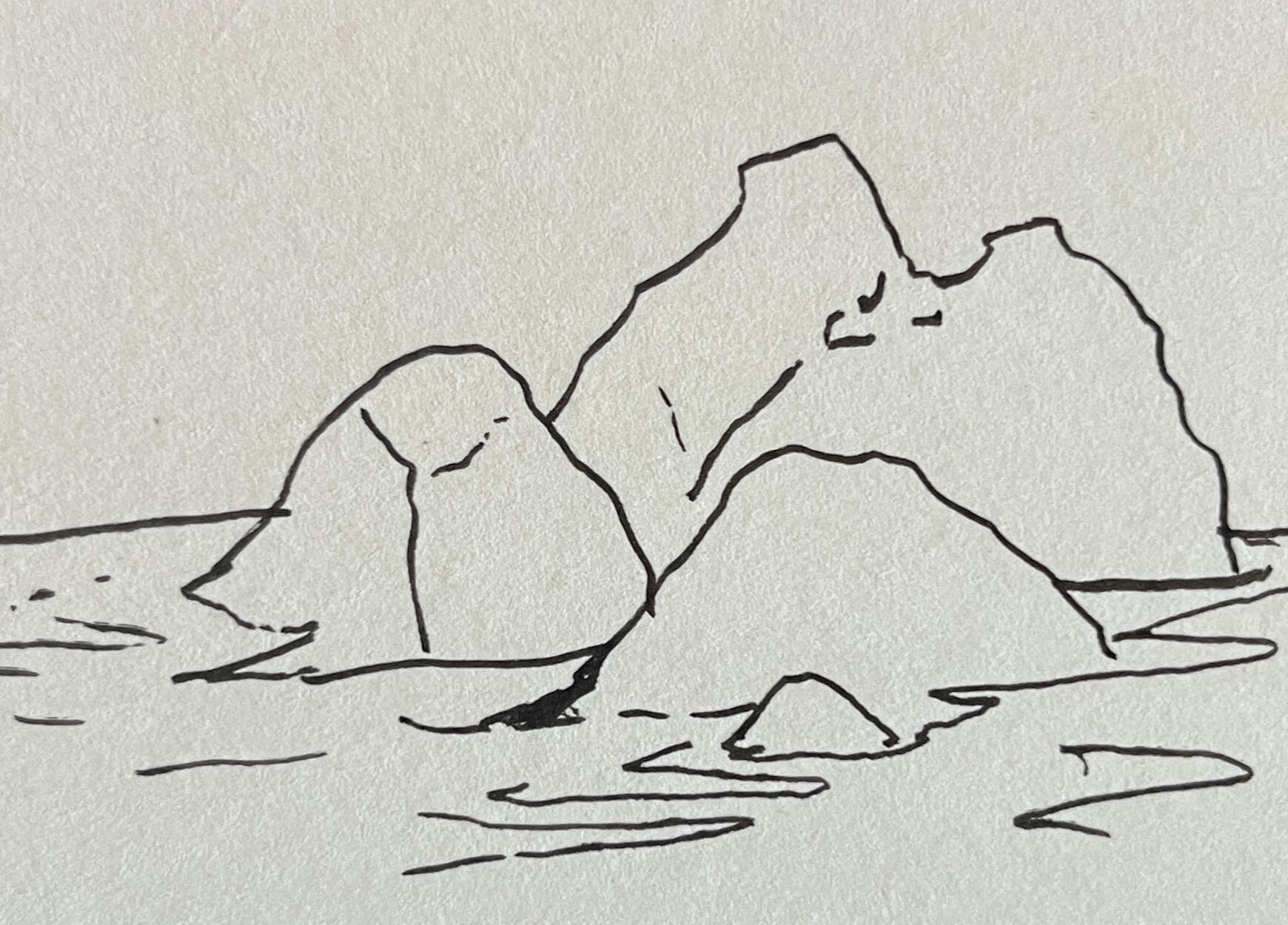
30. Serpentide
Everything known about the banned shoreline fit in a tome no thicker than the first joint of Marlin’s finger. Still, he’d read it about a hundred times. He brought it with him today, unbothered. Unnoticed. No one came to the cove these days unless they had special clearance with the PD or a death wish.Too much bad history here.He’d always thought that he’d come back, being one of the few who survived the cove’s uncanny penchant for stealing away the children who wandered here. Well, it took about sixty-six years, but he’d mustered the courage.It was mostly for his granddaughter, who went missing in the area about two years ago. He supposed he’d come in search of closure as the doc suggested, but standing, sniffling at the top of the shore with his hands stuffed in his pockets, Marlin was less certain than ever that this was the place to find it.Better than the obituaries, though.He supposed it was because everyone liked to tell stories, but few knew the truth. A favorite about this place involved a sea monster that somehow stole those children who got too close to the water. The truth though, the truth was harder to accept. In fact, it was a riptide that got the kids, a nasty undertow dragged them around the rocks and into the cove. That rocky landscape had long been deemed too dangerous for civilians or officials alike, and so access to the cove had been banned entirely.Marlin married the two ideas: the fund one, and the real one. Called it Serpentide.Cops didn’t care for that. They cared about access, though.The path beneath the rocks scraped his knuckles and bruised his knees. No longer the spry young man he once was, certain passages became more difficult or impossible for him now. He paused for breath more than once, knuckling his back and pausing to reread a passage in the book he brought until he mustered the energy to continue.He got himself well and truly lost.At the point he realized it, the path behind had become unrecognizable. Damp. Cold. Alien to his eyes. But he’d come here often as a boy, and thought he would recognize the shelf of rock if only he could remember. He closed his eyes, following the smell of salt and the warble of the water against the rocks. Like the sound from a conch shell, the warble called him deeper, bringing him sliding down into the cove where the bodies bobbed like so many rotting apples.He stared in silence for a time, recognizing that this sight wasn’t new–though he’d almost certainly repressed the memory for sixty odd years. He didn’t bother searching the faces below him; two years was a long time, and many of the figures below had bobbed along the rocks here much longer. He couldn’t hope to recognize her–and despite coming here, he wasn’t certain he wanted to.In the end, he’d only ever wanted to bring the rope, tie it off, and lead the officials inside.
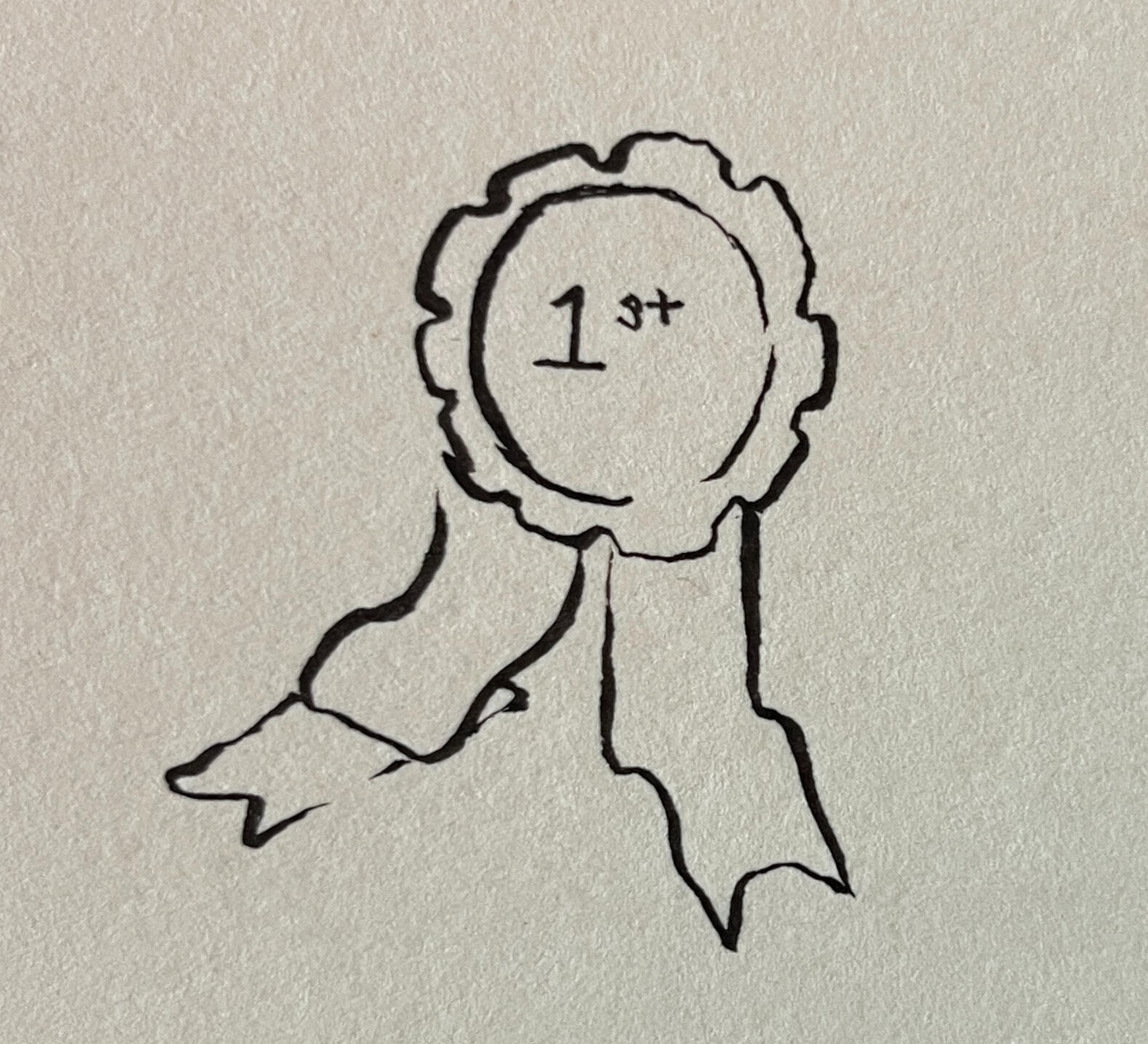
31. Blobby
Sho was the first to create something capable of human emotion. She was going to receive an award for that work in the next ten minutes. She was proud.Now, if only she hadn’t rushed the work quite so much. Though her creature–she thought to call it orange bit because of its color and size–possessed all human emotion, it tended to feel some of them more strongly than others. She couldn’t even commit to the name, which once described it perfectly, because orange-bit was currently very angry.And very, very red.Blobby it was.Despite the tiny tantrum taking place on her shoulder, makeup poked at her eyebrows. Wardrobe tugged a sleek jacket over her arms. The audio-tech was helping her check her mic even when the tiny ball of emotions on her shoulder roared in distaste.Though Blobby admitted as much rage as its tiny frame allowed, the sound it managed was still the faintest thing that no one could take it seriously. Most made a variation of “aww” or laughed outright all while continuing with their separate preparations.On in five.Past work warned Sho what would happen if her creature worked itself to a frenzy. She stepped aside, brushing off further primping in order to offer her little creation a strawberry.It bit her finger. Tearing her digit free, she offered it water next, which it spilled on her new jacket. Dissatisfied, Blobbly let out a third, shaking roar as no less than three pairs of hands shoved Sho onto the stage.Blobby roared louder still, bubbling faintly in her left ear as she reached to accept the award.She did her best to ignore the audience who stared, aghast at the obvious rage displayed in the creature upon her shoulder. She wondered what they must be thinking, especially when Blobby splattered in hot goo across her shoulder and up the left side of her face.“Guess he couldn’t handle the pressure,” she said with an awkward laugh into the mic.
